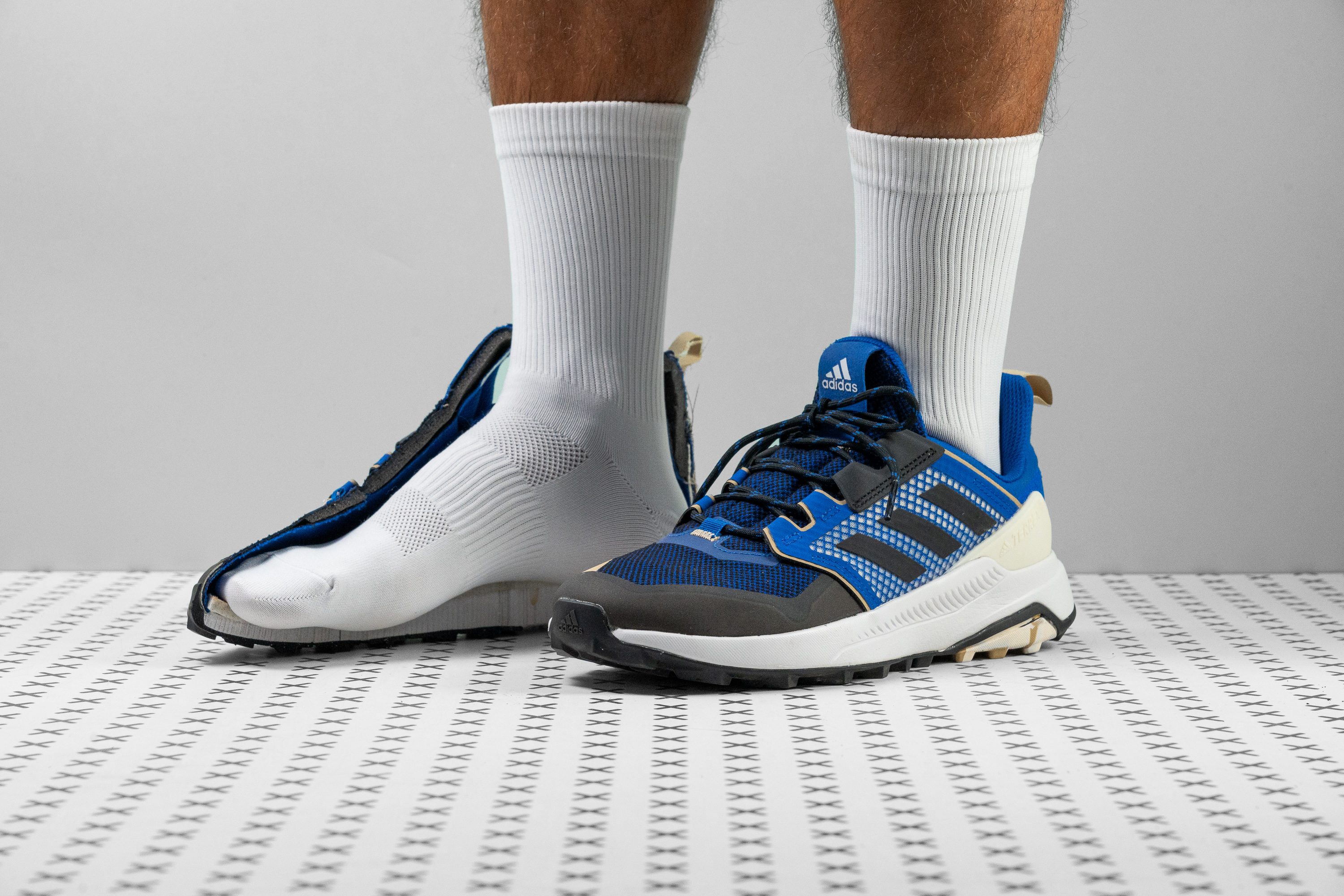Our verdict
- Top pick in best cheap hiking shoes
- Top pick in best Adidas hiking shoes
Pros
- Extra lightweight
- Amazing in-shoe comfort
- Highly breathable
- Balance of cushion and ground feel
- Stable for a light shoe
- More flexible than average
- Welcomes wide feet
- Secure lockdown (bootie upper)
Cons
- Outsole lacks durability
- Not enough grip on wet terrain
Audience verdict
- Top 18% in hiking shoes
- Top 25% in Adidas hiking shoes
Comparison
The most similar hiking shoes compared
+ + Add a shoe | |||||
|---|---|---|---|---|---|
| Audience score | 89 Great! | 88 Great! | 84 Good! | 83 Good! | |
| Price | $110 | $140 | $70 | $110 | |
| Trail terrain | Moderate | Moderate | LightModerate | Light | |
| Shock absorption | - | High | Moderate | Moderate | |
| Energy return | - | Low | Moderate | Moderate | |
| Weight lab Weight brand | 12.7 oz / 361g 8.8 oz / 250g | 11.6 oz / 329g 12.3 oz / 350g | 13.4 oz / 380g 12.3 oz / 350g | 11.6 oz / 329g 9.5 oz / 270g | |
| Lightweight | ✓ | ✓ | ✓ | ✓ | |
| Breathability | Breathable | Breathable | Breathable | Moderate | |
| Use | Speed HikingLight HikingBeginners | Day HikingSpeed HikingLight Hiking | Day HikingLight HikingBeginners | Speed HikingLight HikingUrban hikingBeginners | |
| Orthotic friendly | ✓ | ✓ | ✓ | ✓ | |
| Drop lab | 9.6 mm | 15.0 mm | 13.7 mm | 12.0 mm | |
| Size | Slightly small | Slightly small | True to size | True to size | |
| Midsole softness | Balanced | Soft | Balanced | Balanced | |
| Difference in midsole softness in cold | Normal | Normal | Big | Small | |
| Torsional rigidity | Stiff | Stiff | Stiff | Stiff | |
| Heel counter stiffness | Flexible | Flexible | Moderate | Flexible | |
| Stiffness | Moderate | Moderate | Flexible | Flexible | |
| Outsole hardness | Average | Average | Average | Average | |
| Material | - | Mesh | LeatherMeshSuede | Mesh | |
| Season | SummerAll seasons | SummerAll seasons | SummerAll seasons | All seasons | |
| Toebox durability | Decent | Very good | Very good | Good | |
| Heel padding durability | Bad | Bad | Bad | Bad | |
| Outsole durability | Bad | Good | Decent | Decent | |
| Width / fit | Medium | Medium | Medium | Medium | |
| Toebox width | Medium | Wide | Medium | Medium | |
| Lug depth | 3.4 mm | 3.7 mm | 3.2 mm | 3.8 mm | |
| Heel stack lab | 30.6 mm | 38.8 mm | 32.7 mm | 32.4 mm | |
| Forefoot | 21.0 mm | 23.8 mm | 19.0 mm | 20.4 mm | |
| Widths available | Normal | NormalWide | NormalWide | Normal | |
| Technology | - | - | - | Vibram | |
| Heel tab | Finger loop | Finger loop | Finger loop | Finger loop | |
| Removable insole | ✓ | ✓ | ✓ | ✓ | |
| Ranking | #6 Top 18% | #8 Top 23% | #20 Bottom 42% | #24 Bottom 31% | |
| Popularity | #28 Bottom 20% | #5 Top 15% | #25 Bottom 28% | #26 Bottom 25% |
Who should buy
We are convinced that you will enjoy the company of the Trailmaker if you are after:
- a super lightweight hiking shoe
- a comfy pair for weekend adventures
- a hiking shoe that can accommodate a spontaneous running session
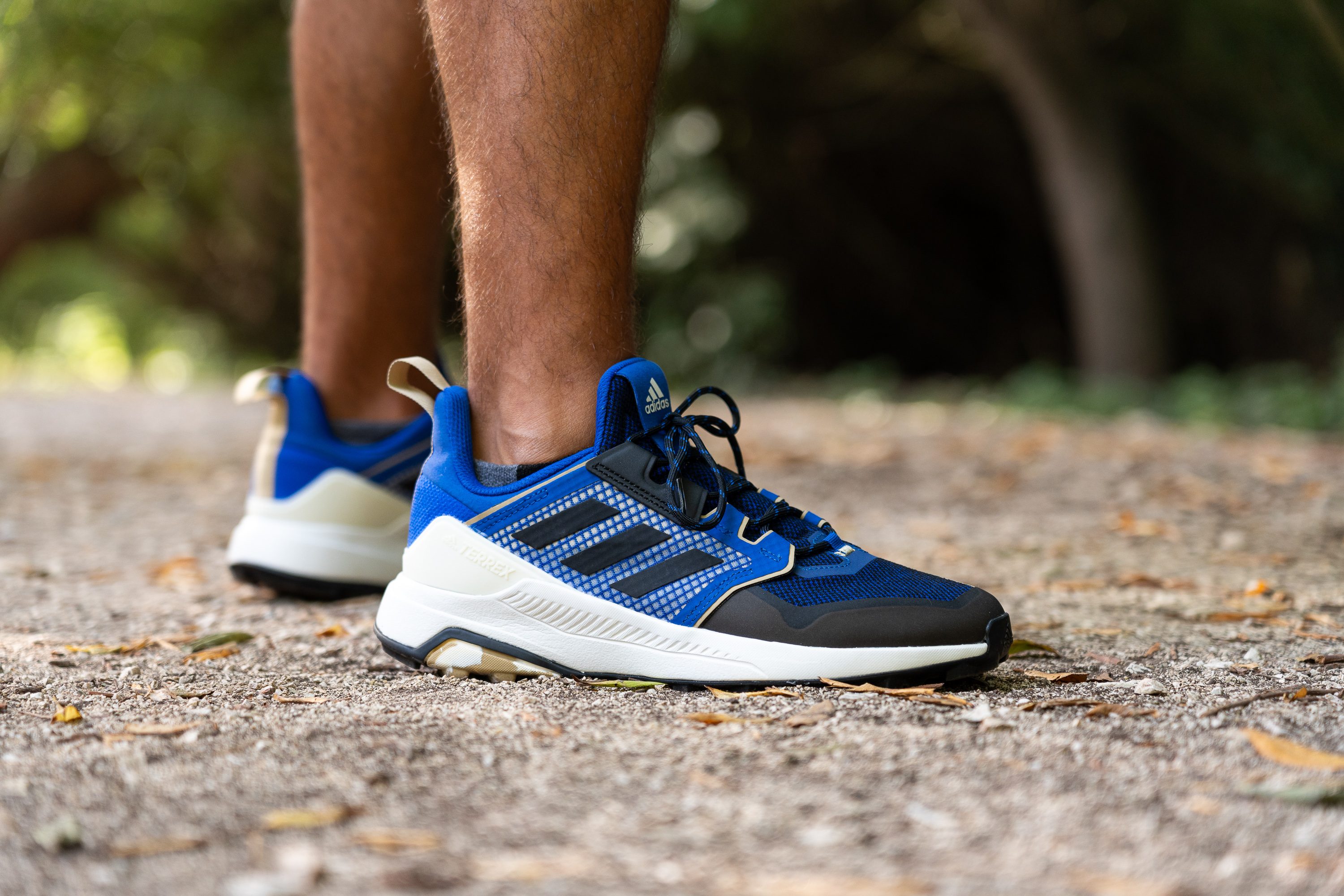
Who should NOT buy
Obviously, Adidas had to make sacrifices in order to create such a lightweight hiking shoe option. First, it did cut down on the outsole's durability choosing TRAXION rubber instead of the renowned Continental. If you are a fan of the latter, we recommend the Adidas Terrex Swift R3 GTX instead.
The Swift also makes for a more stable and sturdy hiking shoe overall (at the expense of weight of course).
Another budget-friendly Adidas Terrex shoe that uses Continental rubber is the AX4.
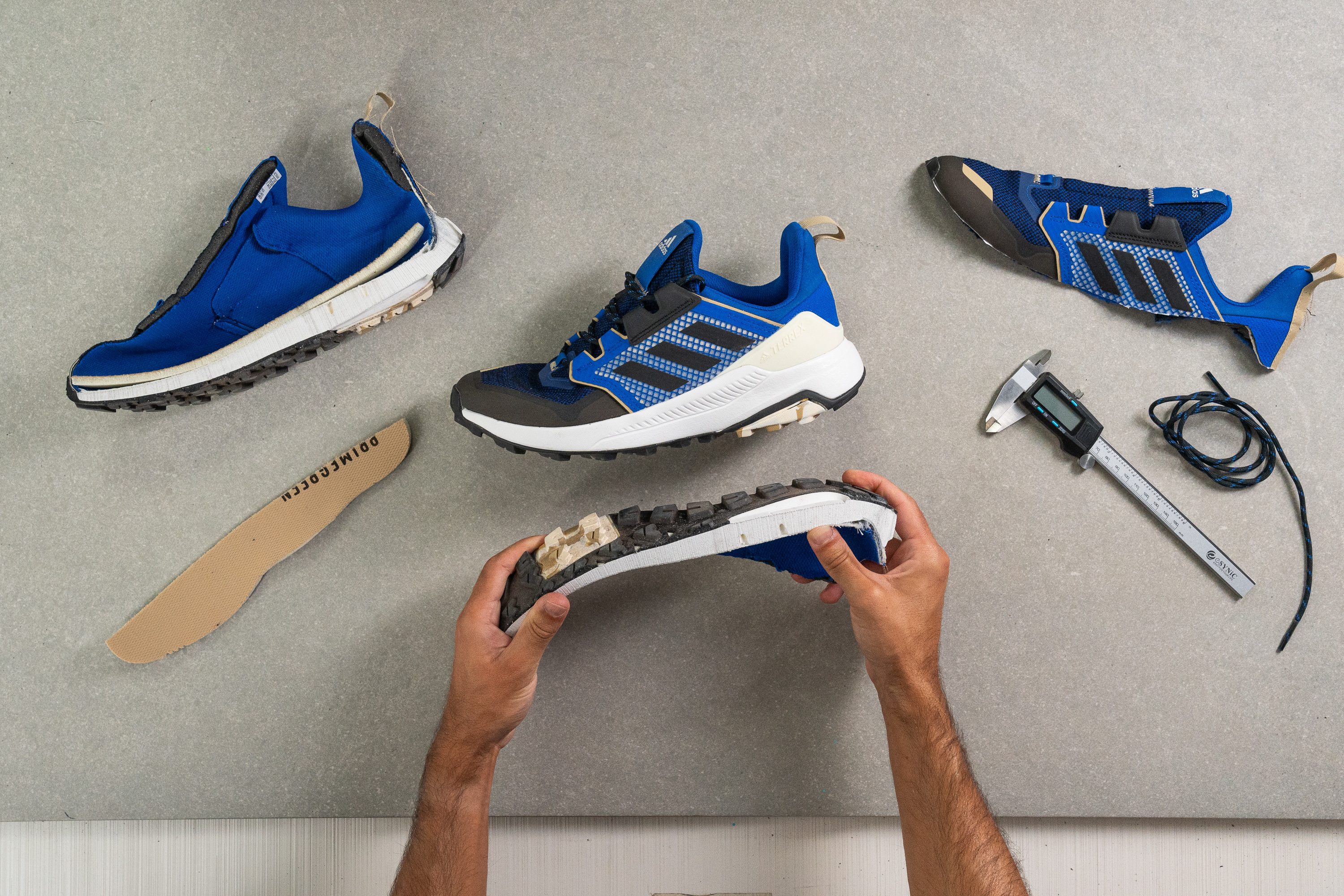
Cushioning
Heel stack
The shoe's tall sidewalls may trick you into thinking that the Trailmaker is max-cushioned. But in reality, this shoe is quite grounded and your foot actually sits inside the midsole.
Cutting the shoe in half and measuring its stack height with a caliper makes it pretty clear. Our tool shows that the heel is 30.6 mm thick which is a few millimeters lower than the average.
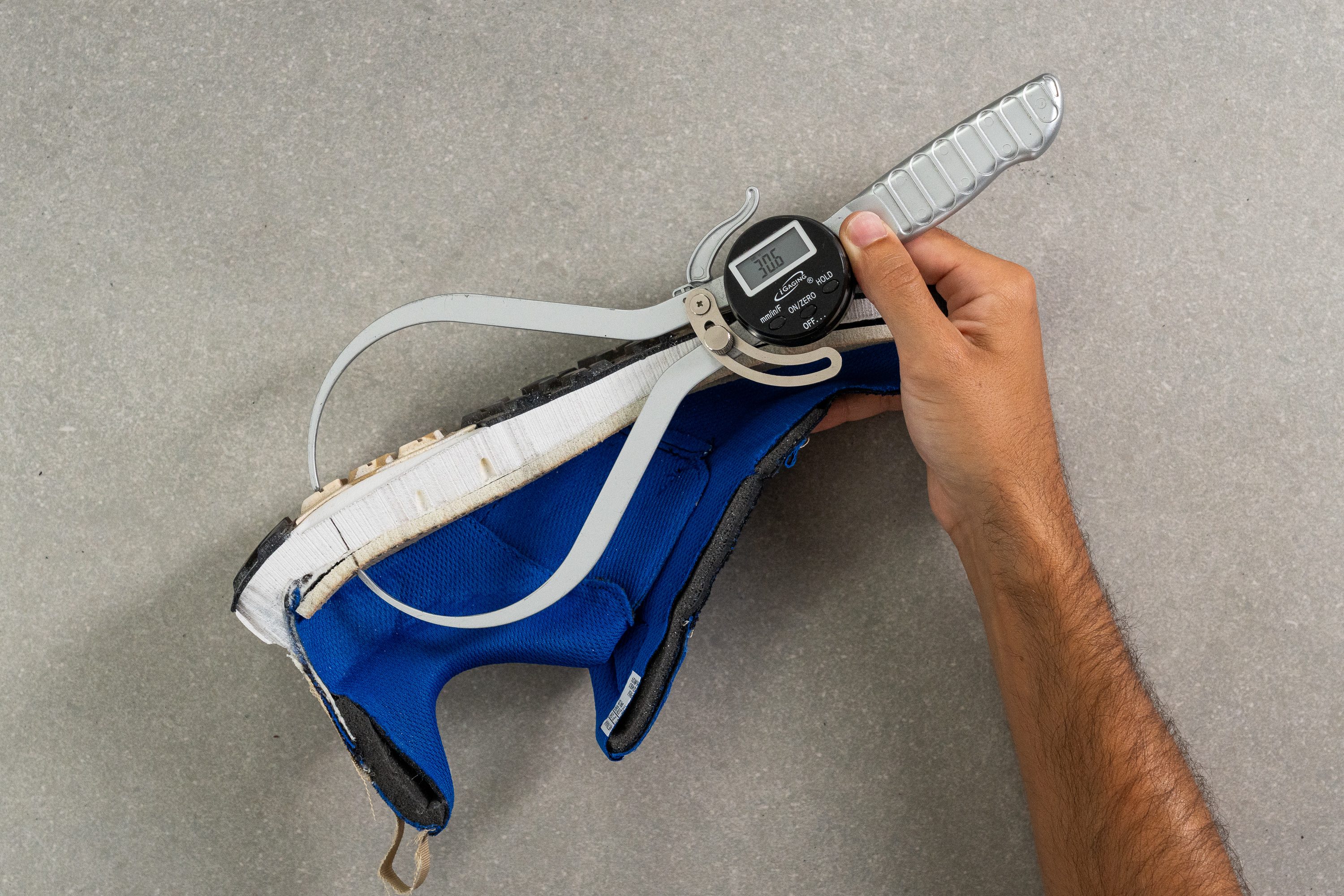
| Terrex Trailmaker | 30.6 mm |
| Average | 32.8 mm |
Forefoot stack
Upfront in the forefoot, we measured the shoe's stack height at 21 mm. This is an average measurement for a hiking shoe and it made the balls of our feet feel quite comfortable throughout the test.
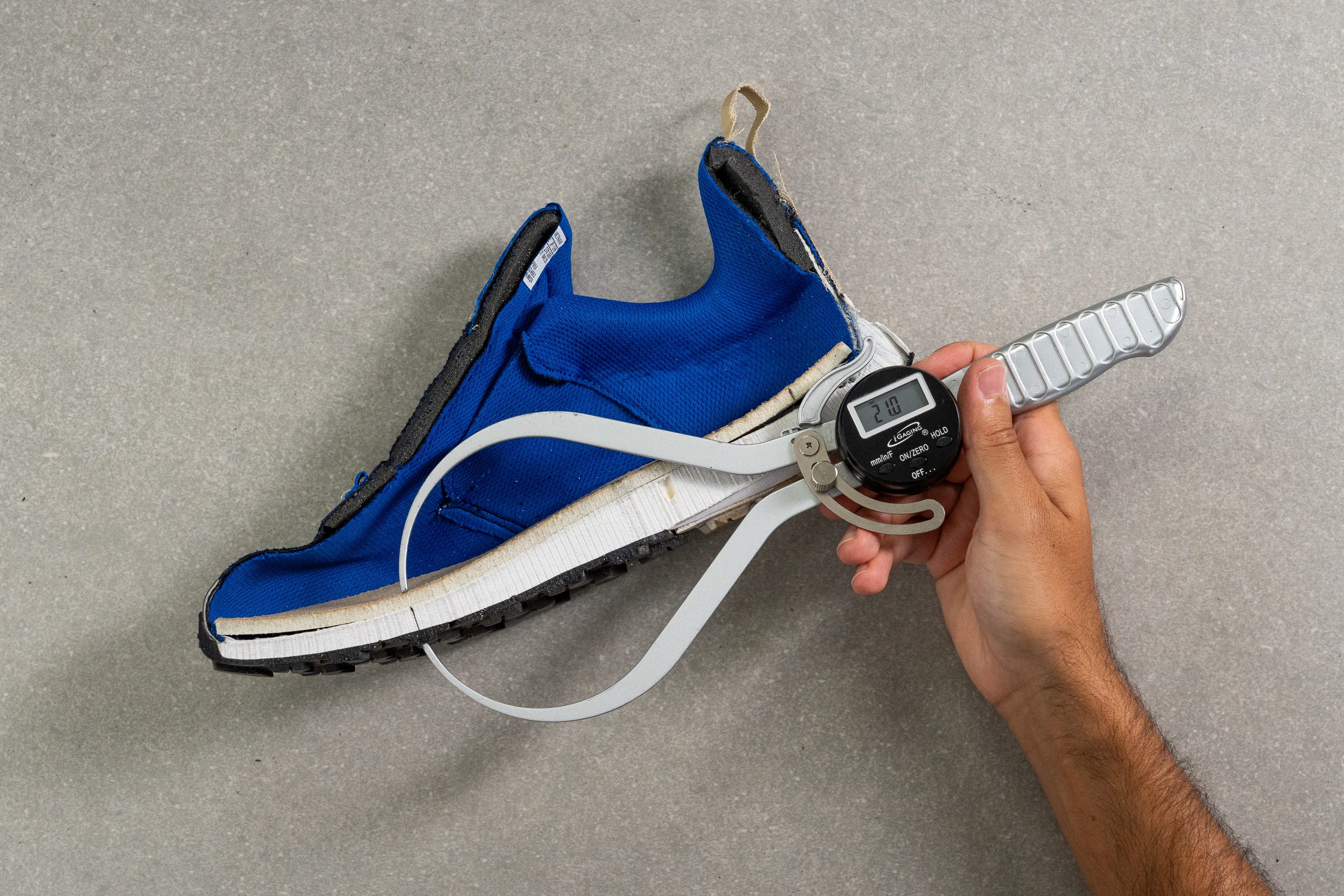
| Terrex Trailmaker | 21.0 mm |
| Average | 22.0 mm |
Drop
A slightly lower-than-average drop also contributed to the shoe's pronounced ground feel.
Calculating the difference between stack heights, we got 9.6 mm, which is a couple of millimeters lower than in most hiking shoes.
We recommend limiting the Adidas Terrex Trailmaker to moderate, non-rocky terrain as it doesn't provide as much foot protection. Stepping on a sharp rock or root won't be the most pleasant experience in this trail shoe.
But in return, it makes for a rather joyful and natural ride.
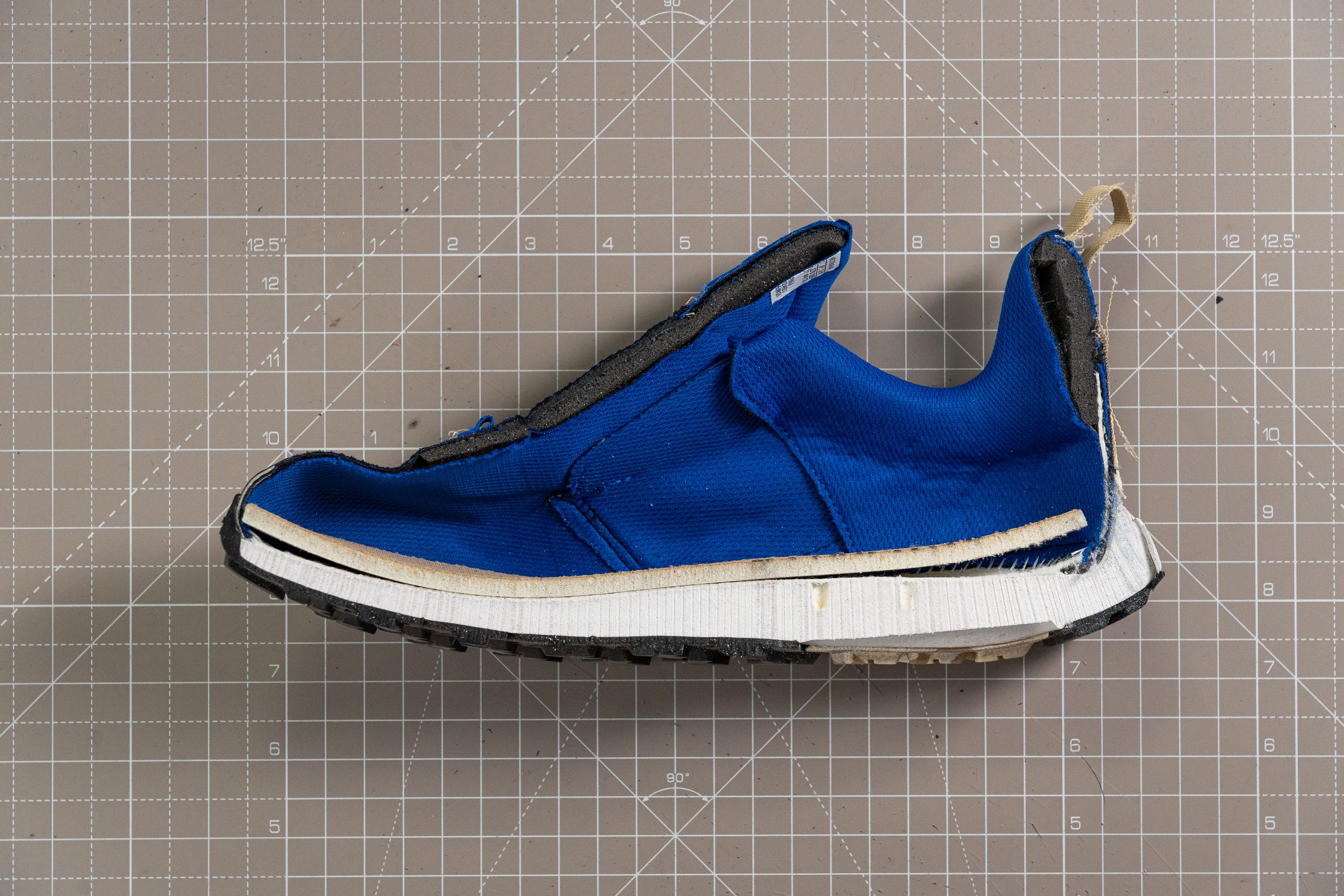
| Terrex Trailmaker | 9.6 mm |
| Average | 10.7 mm |
Midsole softness
Just like most hiking shoes, the Adidas Trailmaker comes slightly on the firm side. This is essential for keeping your foot stable and supported as you navigate the trails with a backpack.
Pressing our durometer against the foam returned 29.5 HA - the same firmness as the average for this category of footwear.
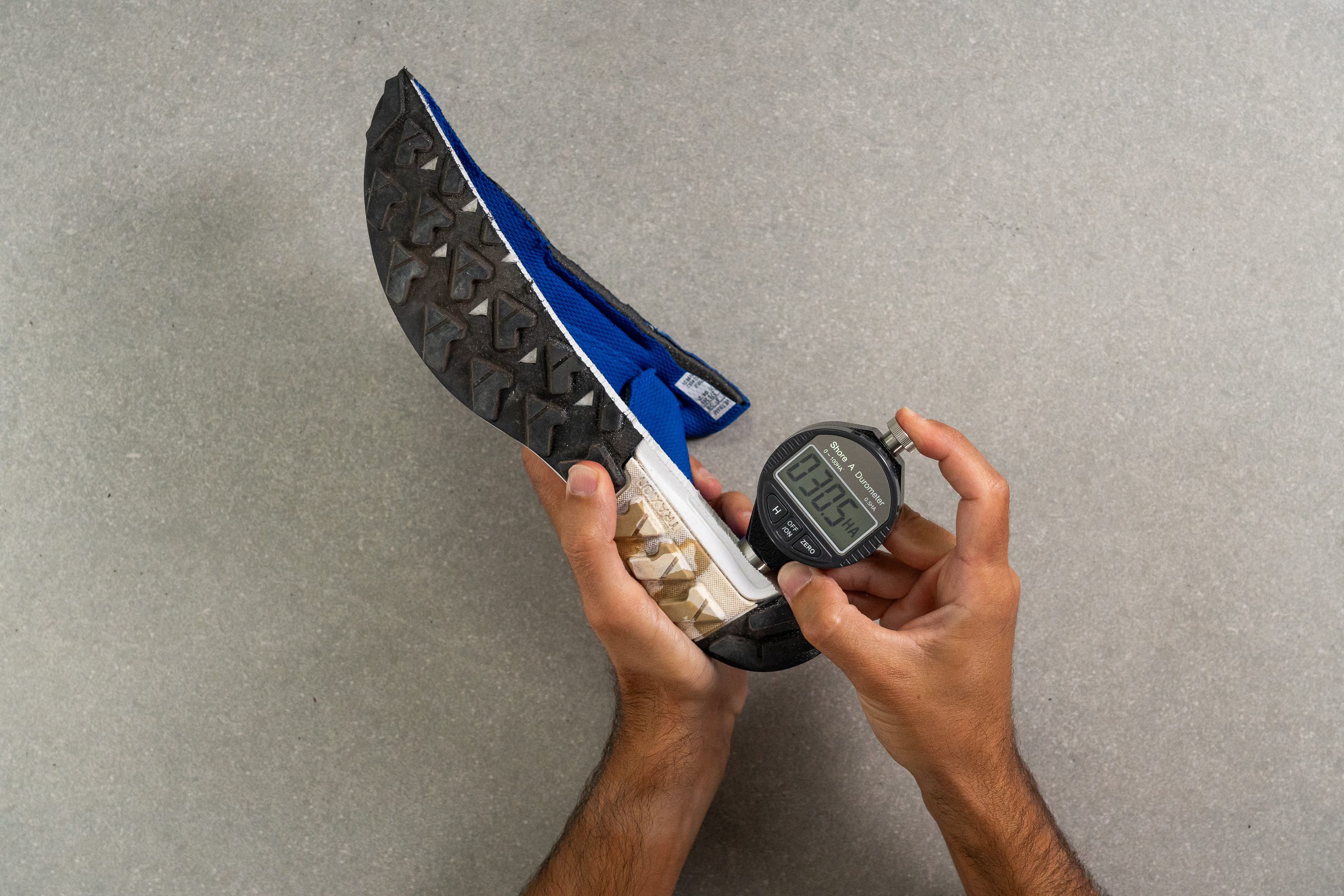
| Terrex Trailmaker | 29.5 HA |
| Average | 27.0 HA |
Size and fit
Size
Adidas Terrex Trailmaker fits slightly small (19 votes).
Internal length
| Terrex Trailmaker | 268.2 mm |
| Average | 268.7 mm |
Width / Fit
For our medium-sized feet, the Adidas Terrex Trailmaker has a perfect, slightly spacious toebox.
Checking the widest part of the forefoot with a caliper, we got a wider-than-average measurement of 102.7 mm.
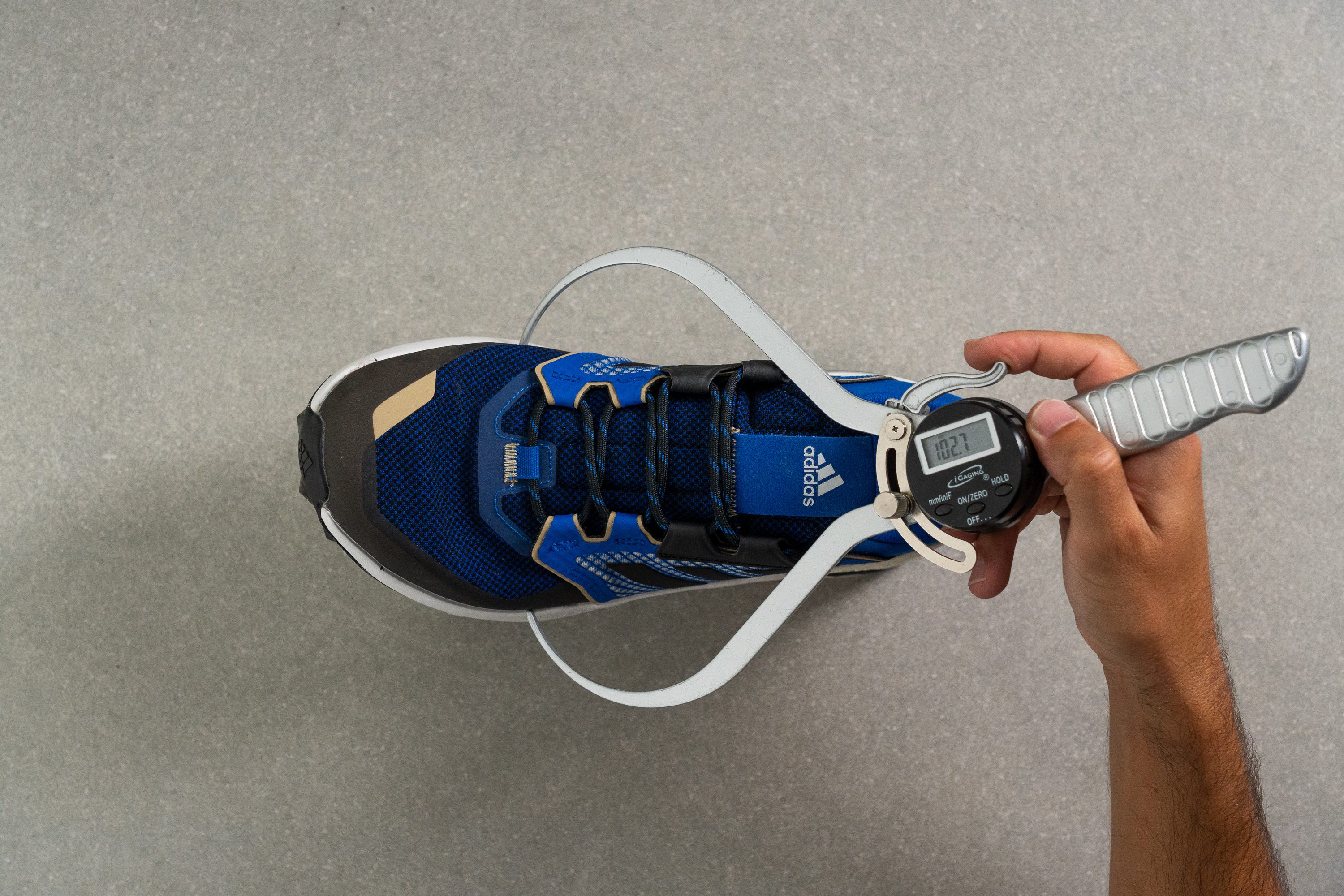
This test follows an older methodology, which is why you don't see recently tested shoes in the chart. Results from different methodologies can not be compared.
| Terrex Trailmaker | 102.7 mm |
| Average | 100.5 mm |
Toebox width
The toebox doesn't get too pointy either. Our caliper shows 79.8 mm of width around the big toe. This is, again, a few millimeters wider than average.
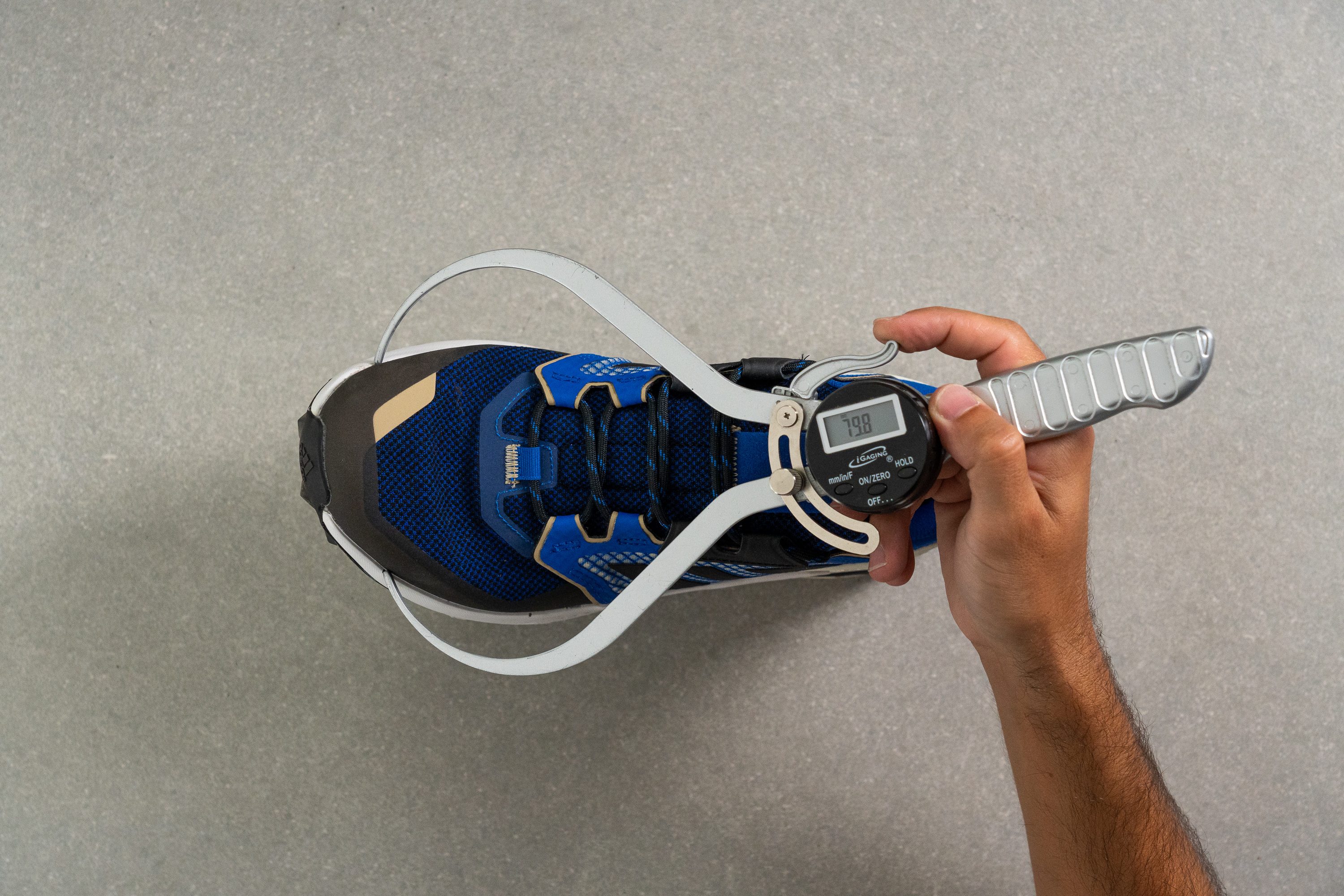
In addition, the woven upper material has a bit of stretch to it.
These findings make us think that people with wider feet are very likely to enjoy the fit of this Adidas hiking shoe.
This test follows an older methodology, which is why you don't see recently tested shoes in the chart. Results from different methodologies can not be compared.
| Terrex Trailmaker | 79.8 mm |
| Average | 81.0 mm |
Laces
Round laces complement the shoe's support system nicely. They slip through the eyelets quite easily, making it very quick to cinch them up one in one second.
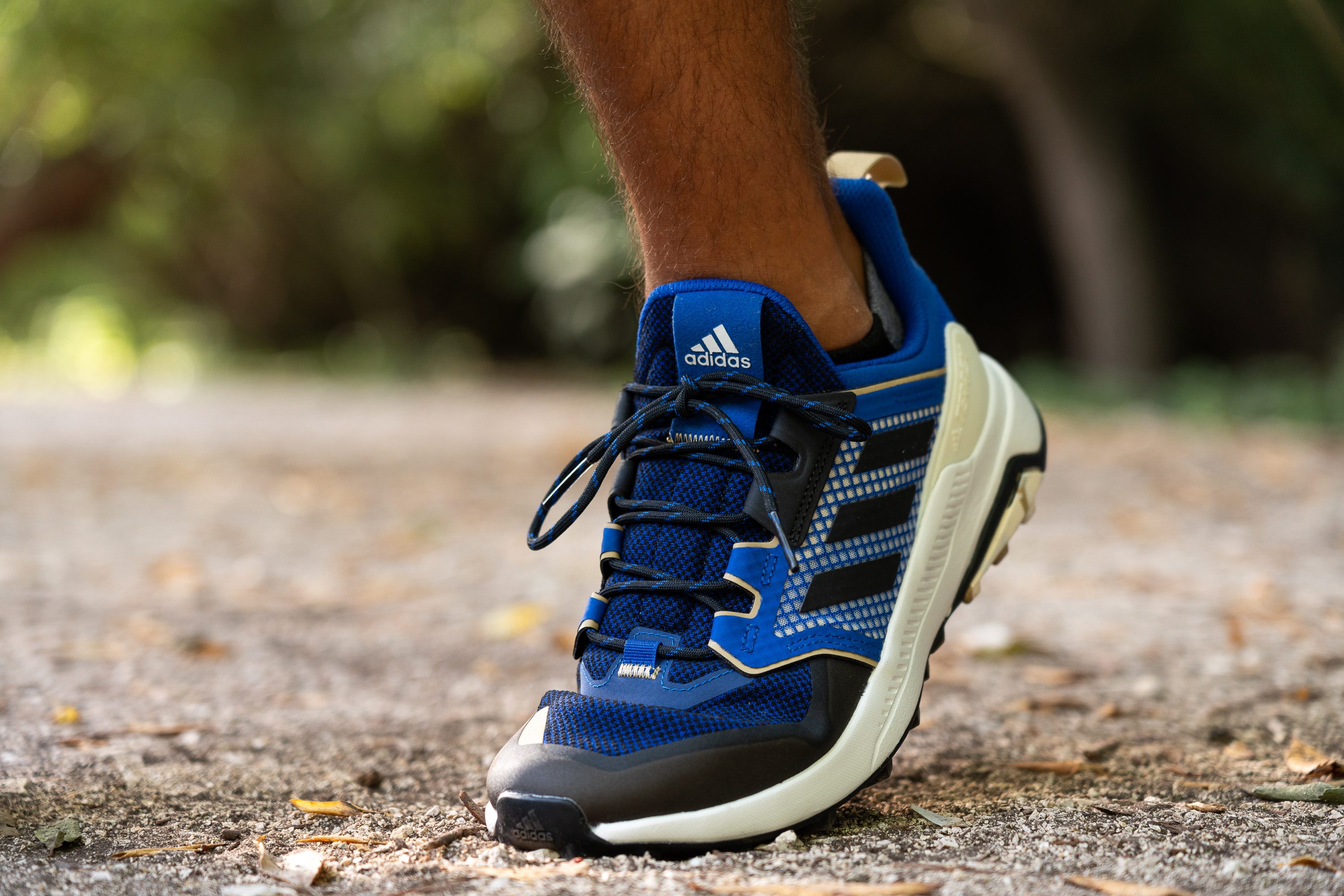
Traction / Grip
Lug depth
Measuring the shoe's lug depth, we got 3.4 mm which is about a millimeter thinner than average.
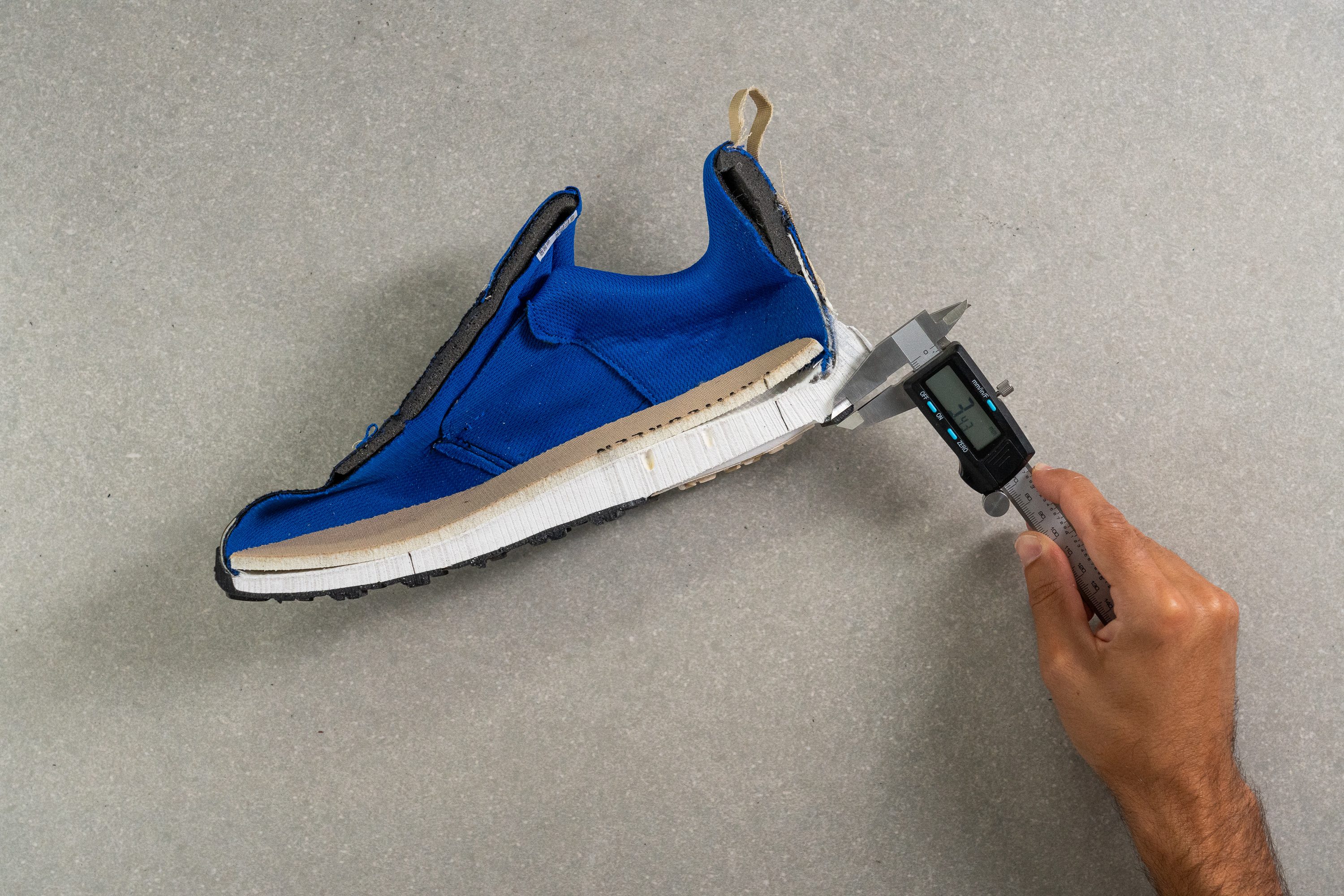
From our own experience, the Trailmaker doesn't have a very aggressive bite. It works fine in most easy-day scenarios but won't be very reliable on wet grass, mud, or ice.
The thing is that the shoe's lugs are rather wide and rounded. Unlike the toothy lugs on the Terrex Swift R3, these treads have a more rounded shape. This is not ideal for latching onto challenging terrain but it at least makes the Trailmaker more versatile.
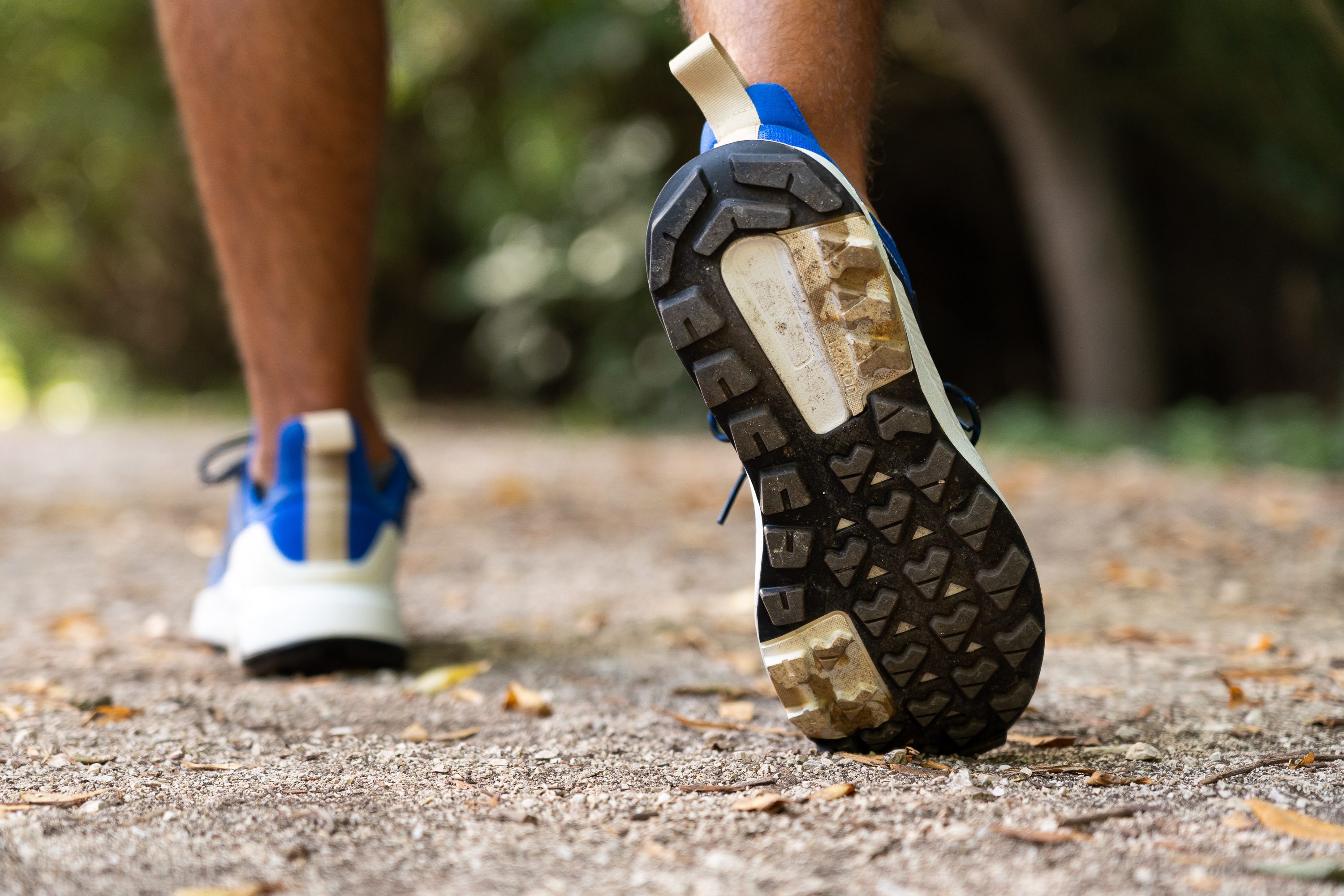
| Terrex Trailmaker | 3.4 mm |
| Average | 4.0 mm |
Flexibility / Stiffness
On the foot, the Adidas Terrex Trailmaker feels a lot like a trail running shoe and this is definitely reflected in our lab results.
The shoe's above-average flexibility is one of these parameters.
It takes only 20.5N of force to bend the shoe to a 90-degree angle, according to our force gauge. That's a whopping 80% less than it takes on average!
This test follows an older methodology, which is why you don't see recently tested shoes in the chart. Results from different methodologies can not be compared.
| Terrex Trailmaker | 20.5N |
| Average | 29.6N |
Weight
The lack of outsole durability on the Adidas Trailmaker is very well compensated for by its incredibly lightweight build!
Weighing this hiking shoe in a men's US size 9, we only got 12.7 oz (361g)! This is more than an ounce lighter than the average and is also one of the lightest hikers in our catalog!
If you're wondering what shoe is even lighter than that, have a look at the Merrell Moab Speed GTX (11.4 oz/323g).
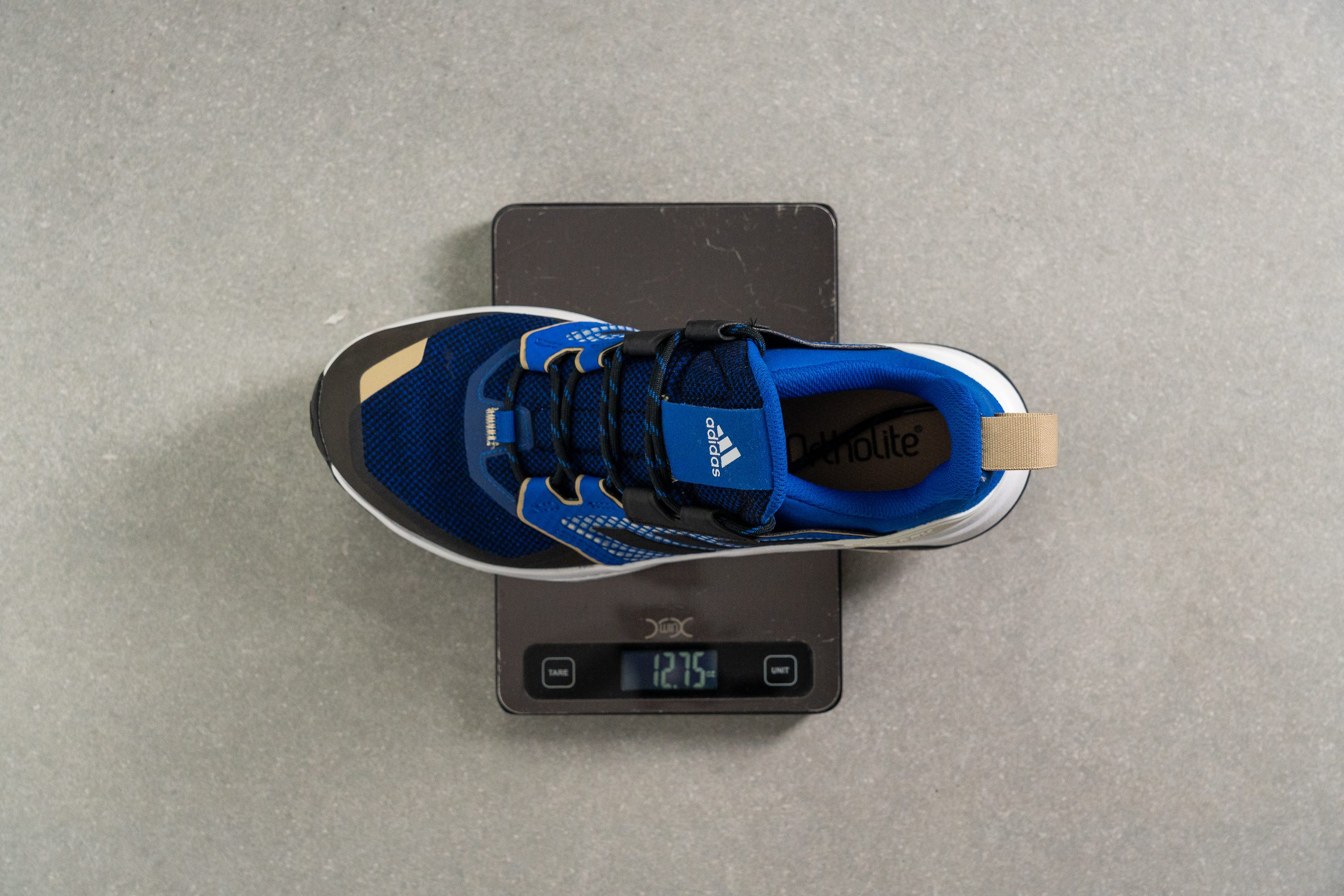
| Terrex Trailmaker | 12.7 oz (361g) |
| Average | 13.4 oz (380g) |
Breathability
Wearing the Adidas Terrex Trailmaker on a warm summer day felt right at home to us!
The shoe's highly breathable upper makes it one of the most well-ventilated hiking shoes in our lab. You can see from the video below how the smoke that we pumped through the material escapes freely and evenly through all parts of the upper.
This earns the shoe's breathability a solid score of 4 out of 5!
This is quite surprising as the shoe doesn't look very breathable in the first place. Even in our transparency test where we hold half of the shoe against the light, none of it shines through!
The same thing happens when we take a close-up look at the fabric through our microscope.
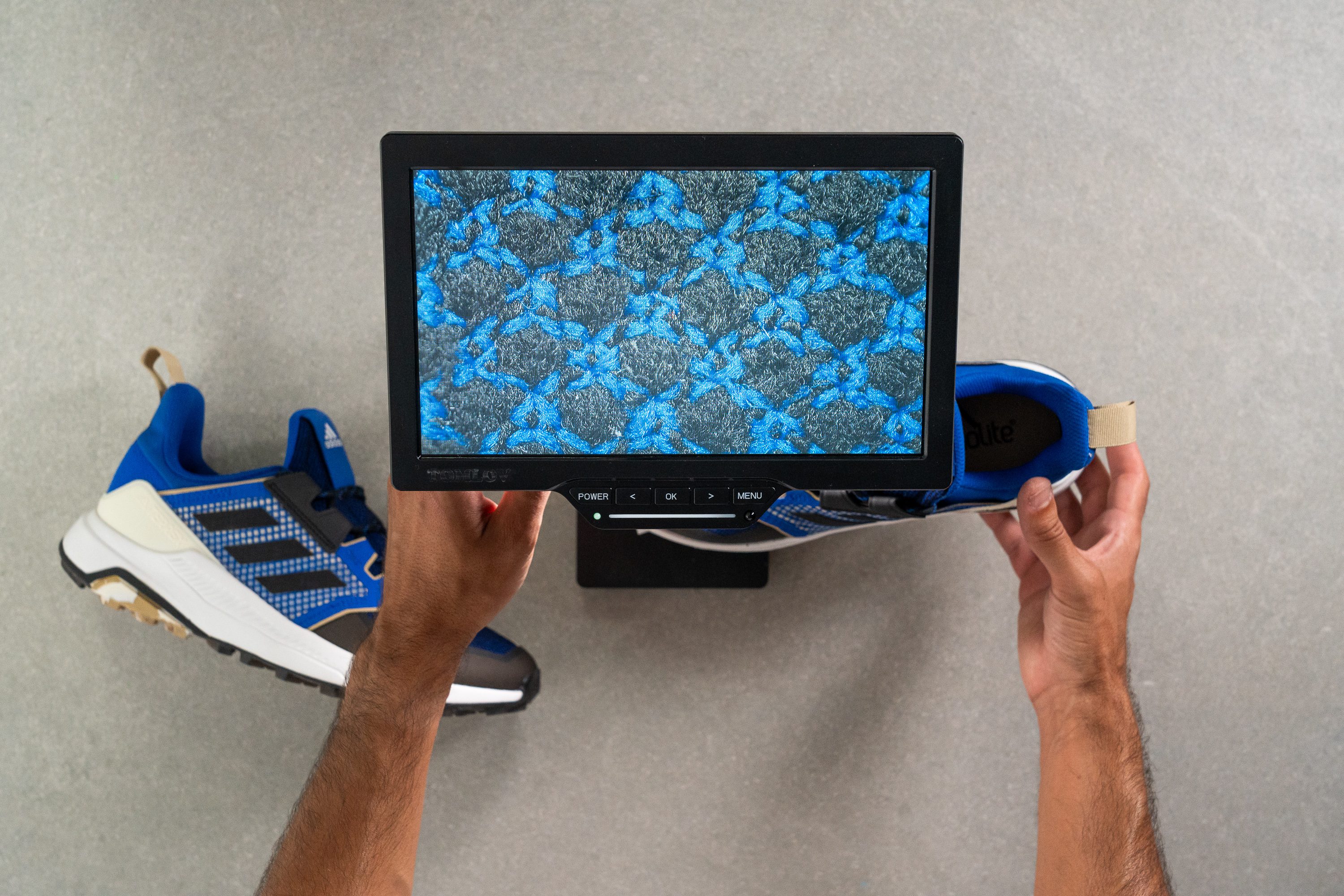
Not a single visible perforation! And yet, the porous nature of this woven fabric does the trick and allows the air to do its job.
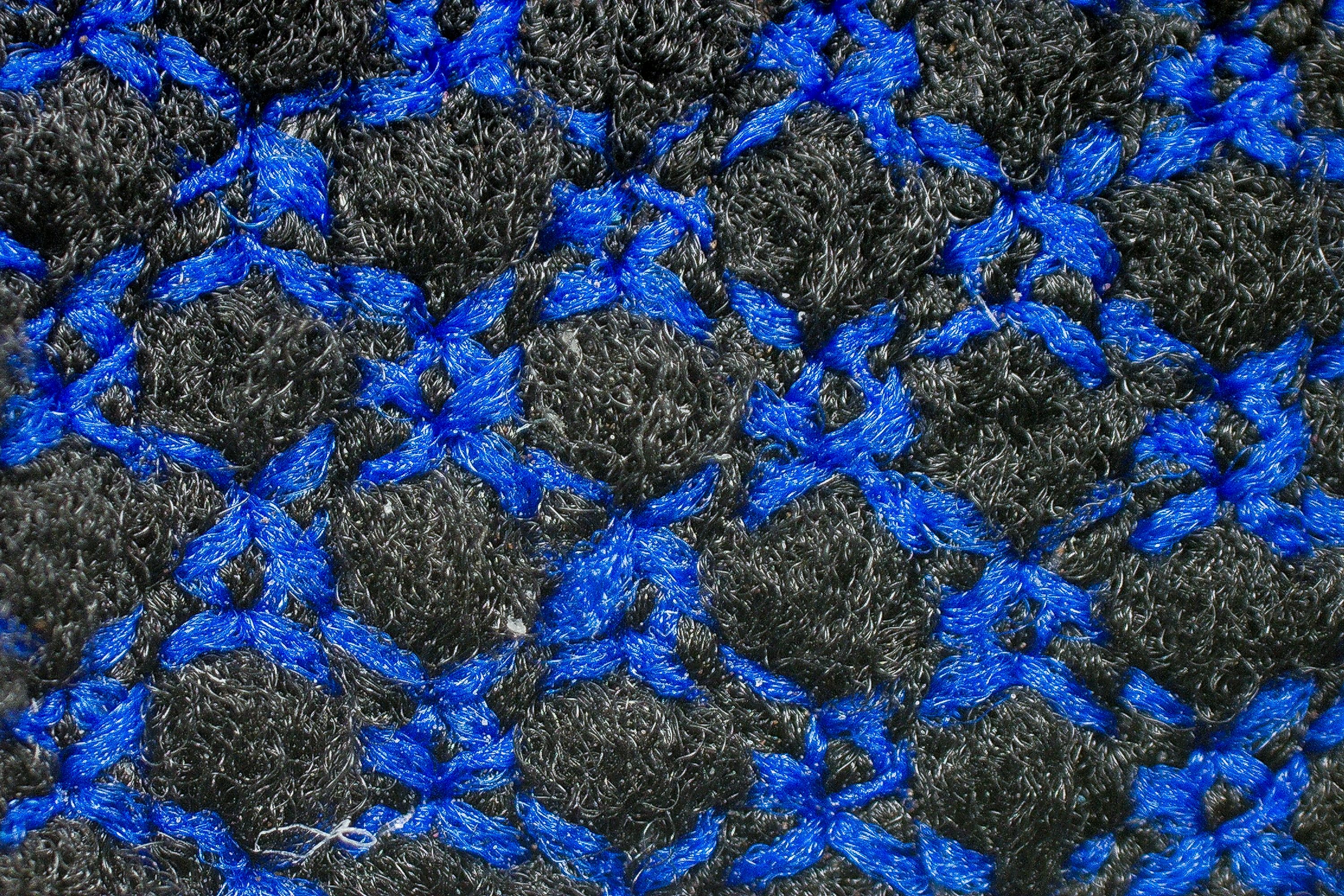
| Terrex Trailmaker | 4 |
| Average | 2.4 |
Stability
Lateral stability test
Let's get this straight: the Adidas Trailmaker is NOT meant for backpacking or long hikes. Neither does it have any tangible arch support for those with flat feet/overpronation.
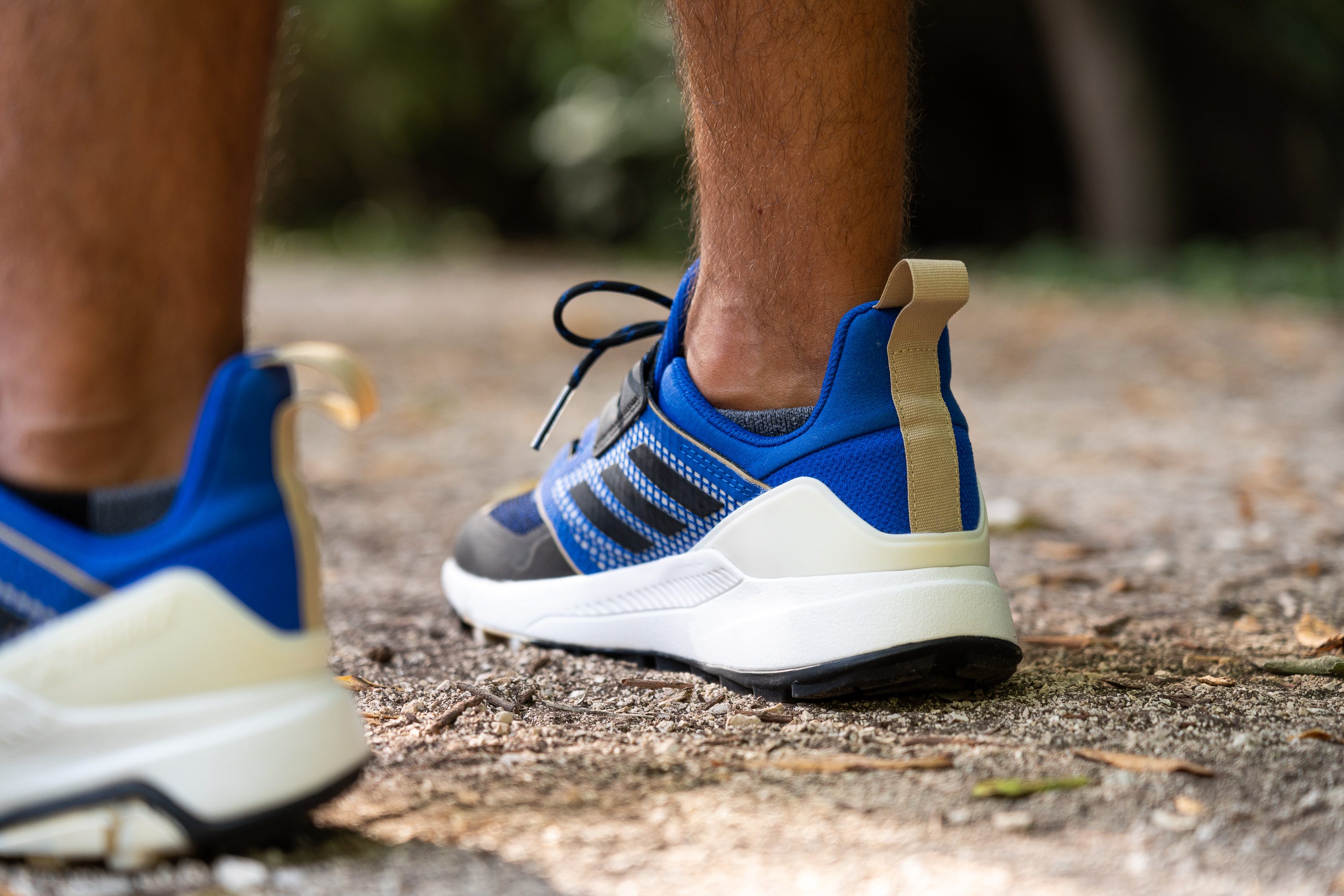
BUT! It is a rather stable shoe of its kind - a lightweight hiker for easy hikes on moderate terrain.
Torsional rigidity
Thanks to its raised sidewalls (especially around the heel) and slightly firm midsole, the Trailmaker has a good amount of torsional rigidity.
Assessing it in our manual test, we rated the shoe as 4 out of 5 (nearly the stiffest!). Out on the trail, this translated into a pleasantly supportive but not overbearing experience.
| Terrex Trailmaker | 4 |
| Average | 3.7 |
Heel counter stiffness
Some stiffness is also present in the shoe's heel counter. Squeezing and pushing it, we felt like it was 3 out of 5 - neither too stiff nor too forgiving. Just right for a foot with neutral pronation.
| Terrex Trailmaker | 3 |
| Average | 3.7 |
Midsole width - forefoot
Wide platform - check!
Our caliper shows that the Trailmaker's platform is 114.5 mm in the widest part of the forefoot. This is a couple of millimeters wider than average and makes for a rather stable landing area.
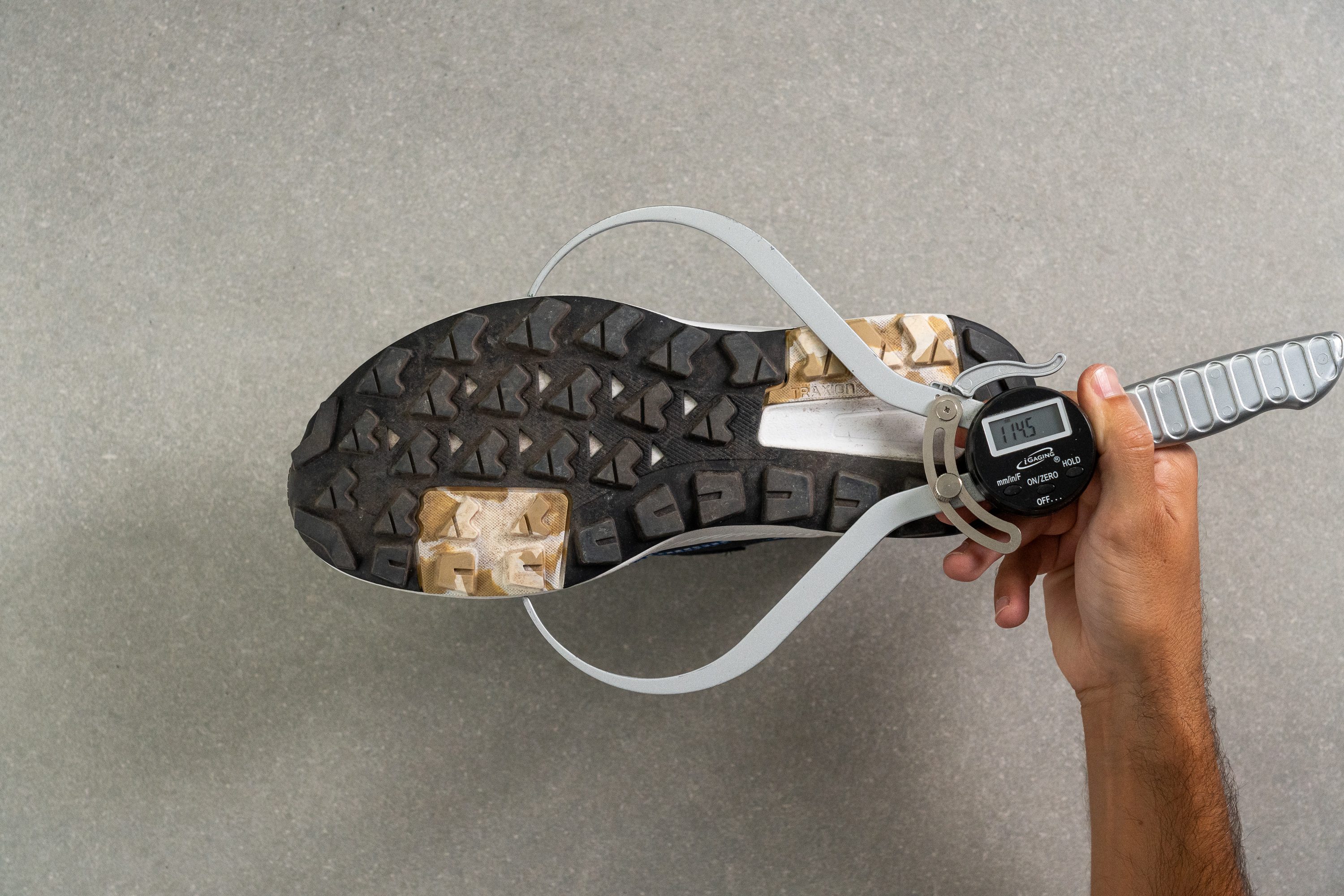
| Terrex Trailmaker | 114.5 mm |
| Average | 111.3 mm |
Midsole width - heel
In the heel, the widest part of the sole also shows a good result - 87.2 mm. About the same as the average of hiking shoes.
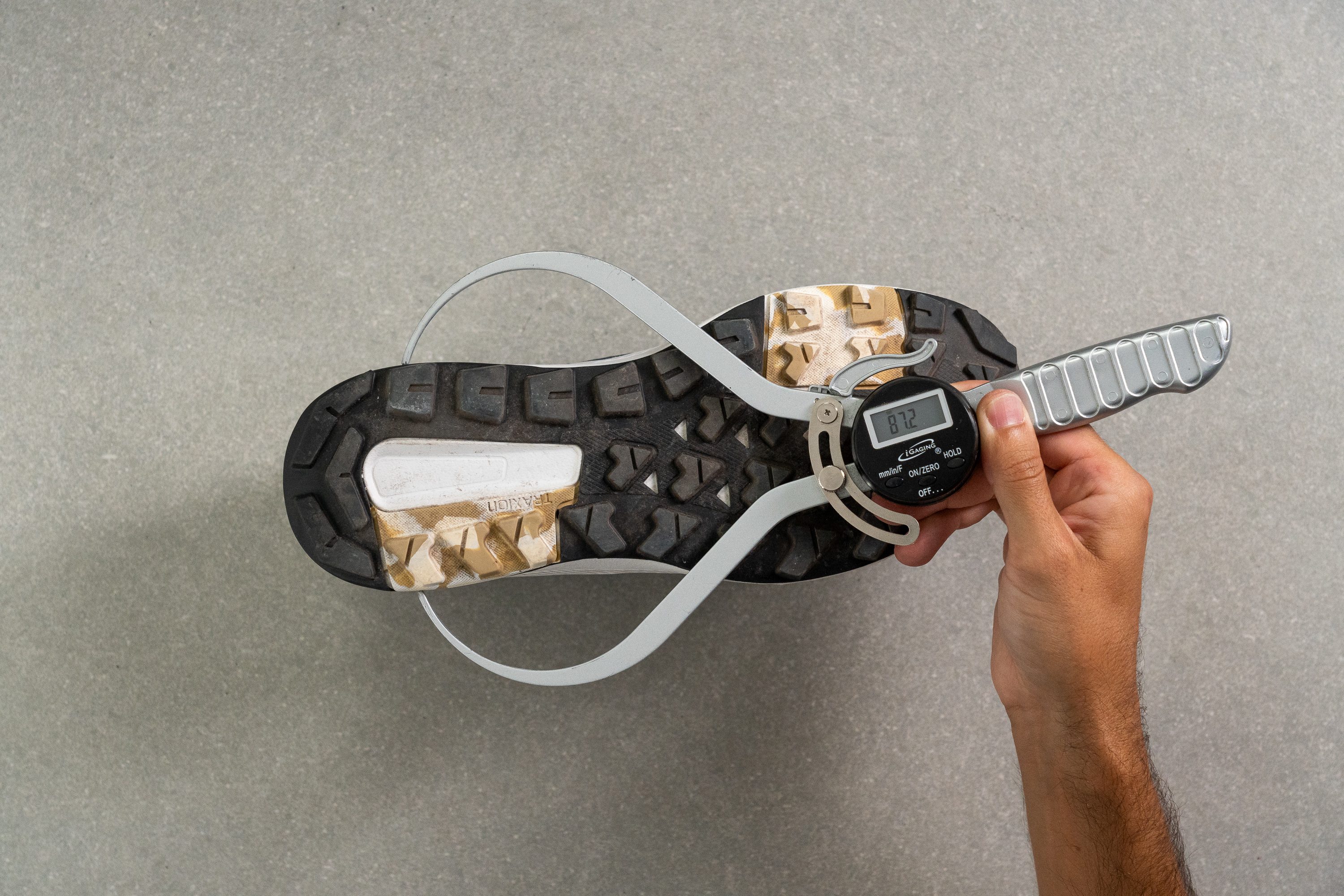
| Terrex Trailmaker | 87.2 mm |
| Average | 87.9 mm |
Durability
Toebox durability
Adidas clearly put a lot of thought into the Trailmaker's upper materials. We admire the balance of breathability and abrasion resistance that this hiking shoe achieves!
What first appears like soft and delicate wool proves to be a durable shield in our Dremel test. After applying the tool to the shoe's toebox for 12 seconds at the speed of 5K RPM, the damage to the fabric was merely cosmetic!
Thus, quite unexpectedly for us, the shoe earned a higher-than-average score of 3 out of 5 for its toebox durability.
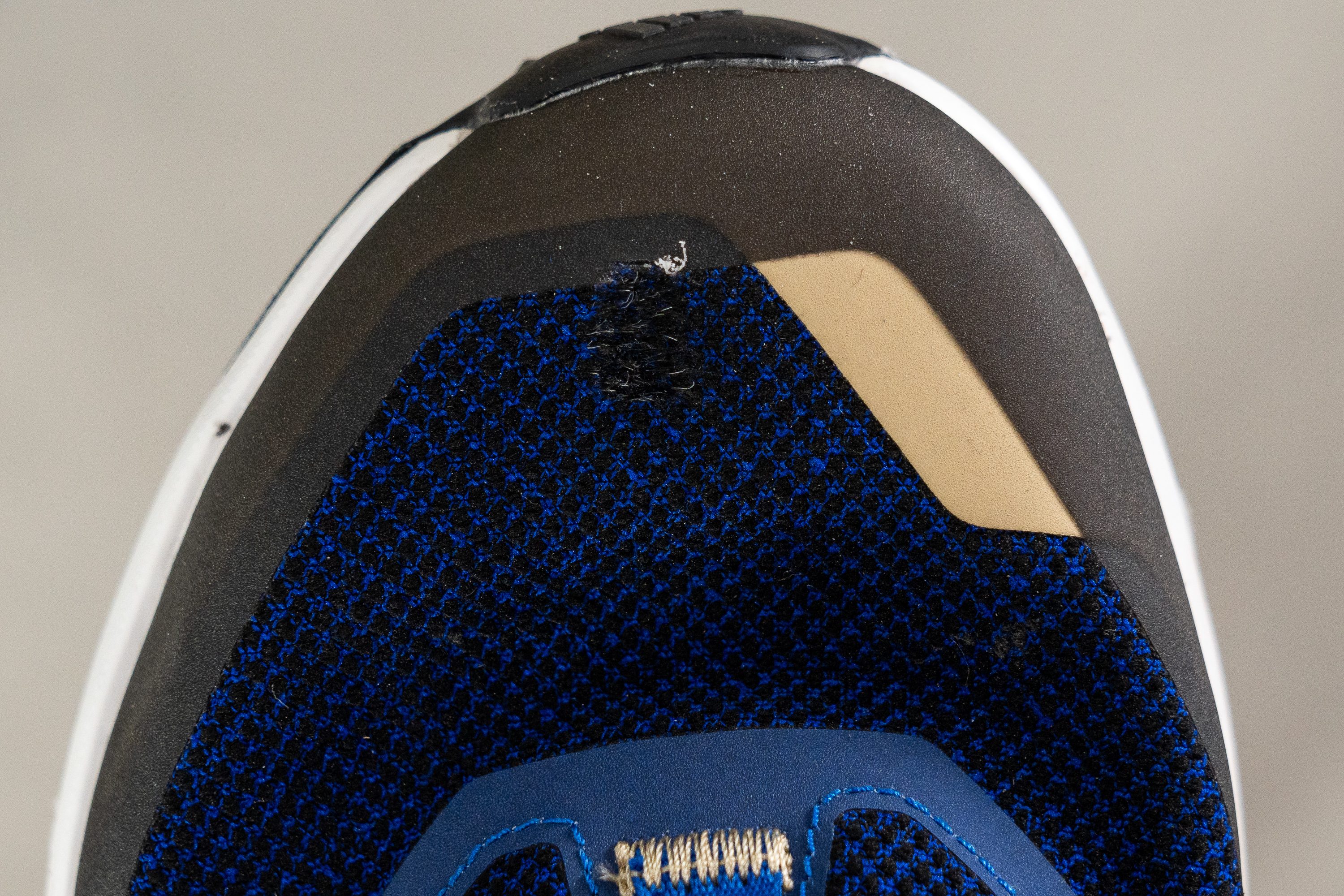
| Terrex Trailmaker | 3 |
| Average | 3.7 |
Heel padding durability
Unfortunately, the shoe's heel padding failed to stand as strong to the Dremel challenge as the toebox did.
After only 4 seconds of drilling, the fabric lining the heel counter just gave up.
On the bright side, damaging this part of the shoe doesn't compromise its overall performance. It can also be easily restored by a shoe service if needed.
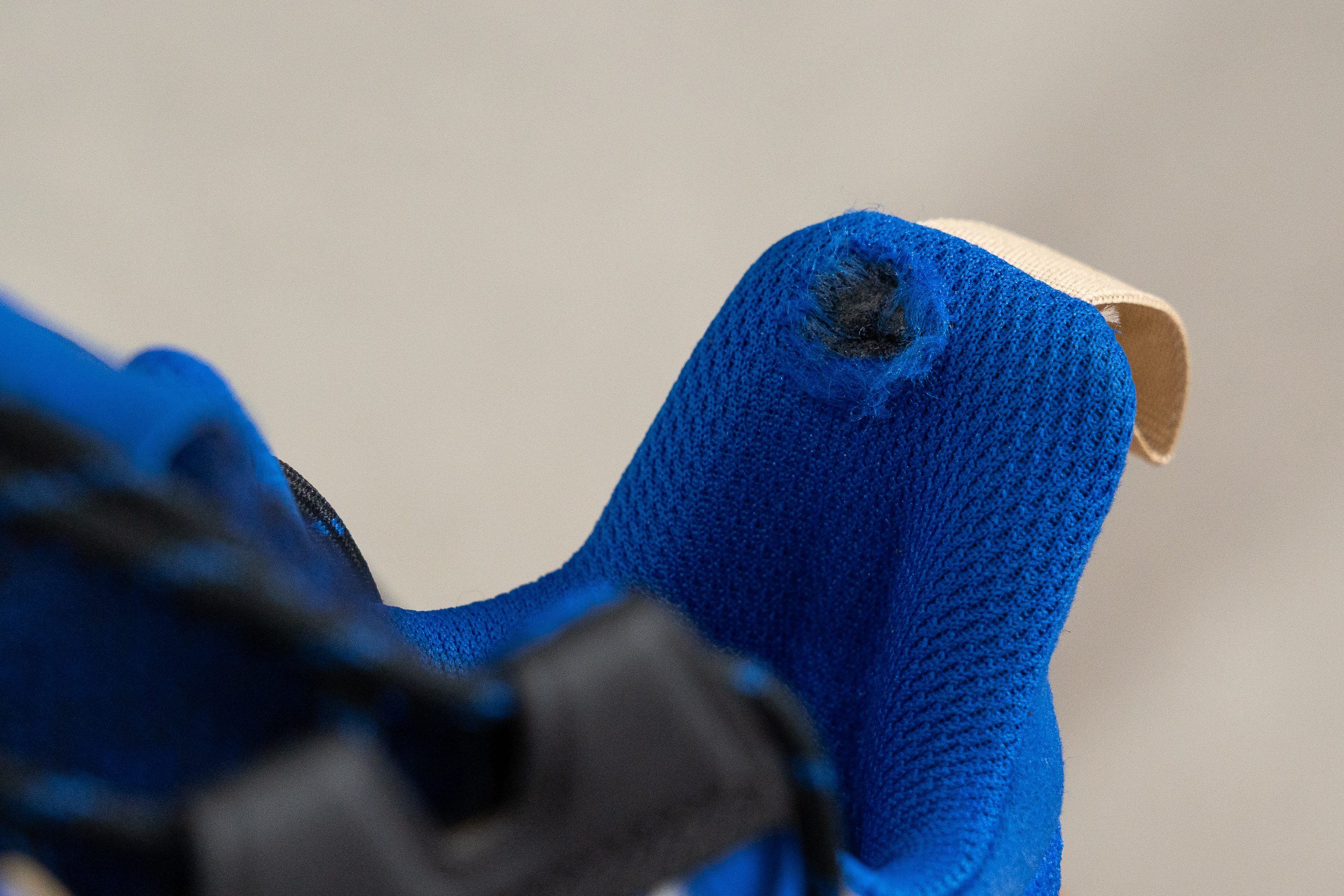
| Terrex Trailmaker | 1 |
| Average | 3 |
Outsole hardness
To protect the bottom of the Terrex Trailmaker, Adidas went with their TRAXION rubber compound. As opposed to the brand's famous Continental rubber, TRAXION is more oriented towards soft ground, grass, and trails.
Using a durometer, we measured its firmness at 85.4 HC. This is just as hard as the Continental rubber on the Adidas Terrex Swift R3 GTX. However, when it came to testing the outsole's actual resistance to abrasion, we were disappointed, to say the least...
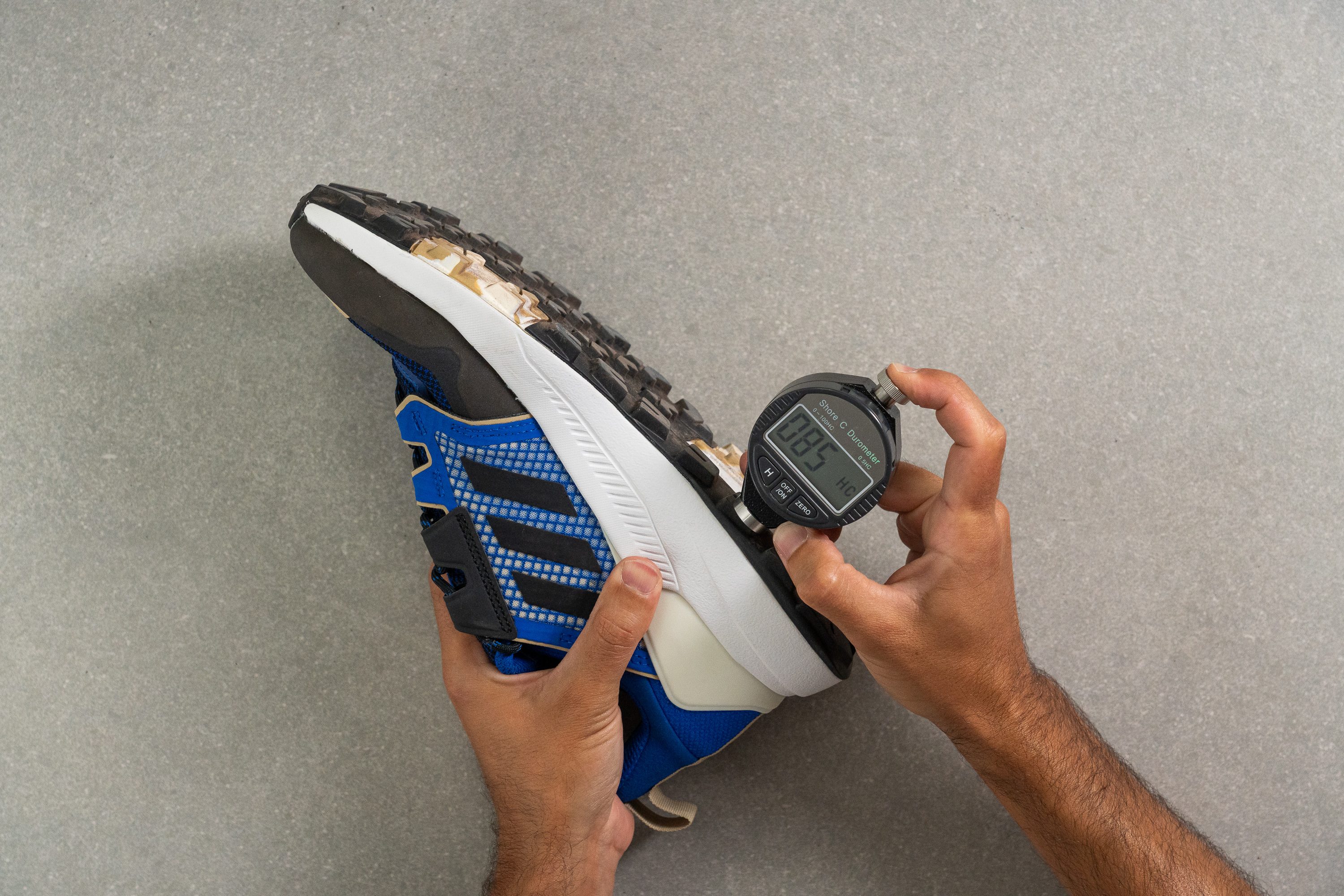
| Terrex Trailmaker | 85.4 HC |
| Average | 85.1 HC |
Outsole durability
Applying the Dremel to one of the shoe's lugs at the speed of 10K RPM for 22 seconds, we found that the tool nearly went through the entire thing! This unfortunate sight rarely happens in our lab!
And yet...our tread gauge says that the newly created dent is as deep as 2 mm.
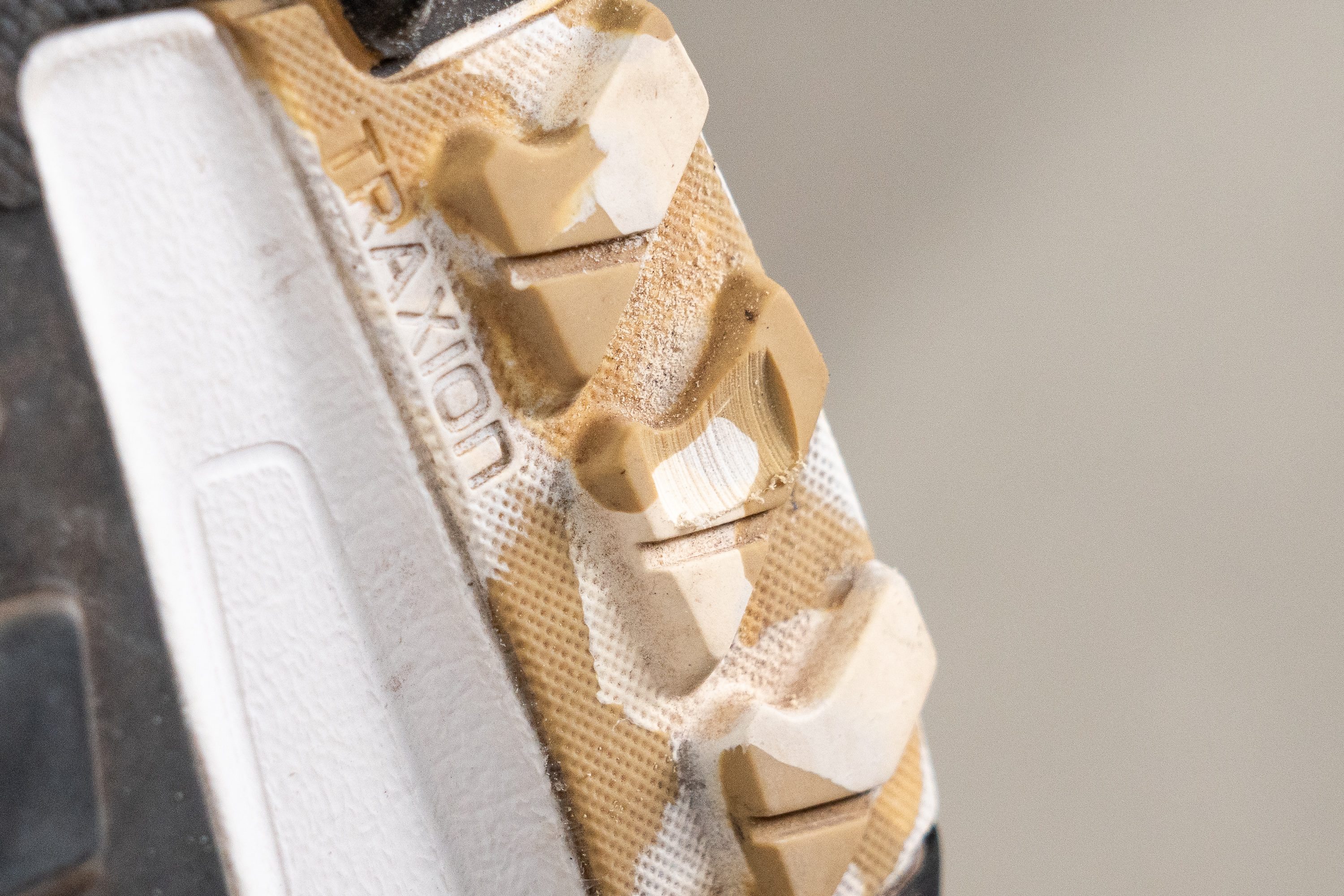
For that reason, we recommend staying away from technical rocky routes and asphalt roads if you want to extend the life of your Trailmaker pair.
| Terrex Trailmaker | 2.0 mm |
| Average | 1.0 mm |
Outsole thickness
Aside from the shoe's lugs, the outsole layer is 2.2 mm thick on this Adidas Terrex model. Quite average for a hiking shoe.
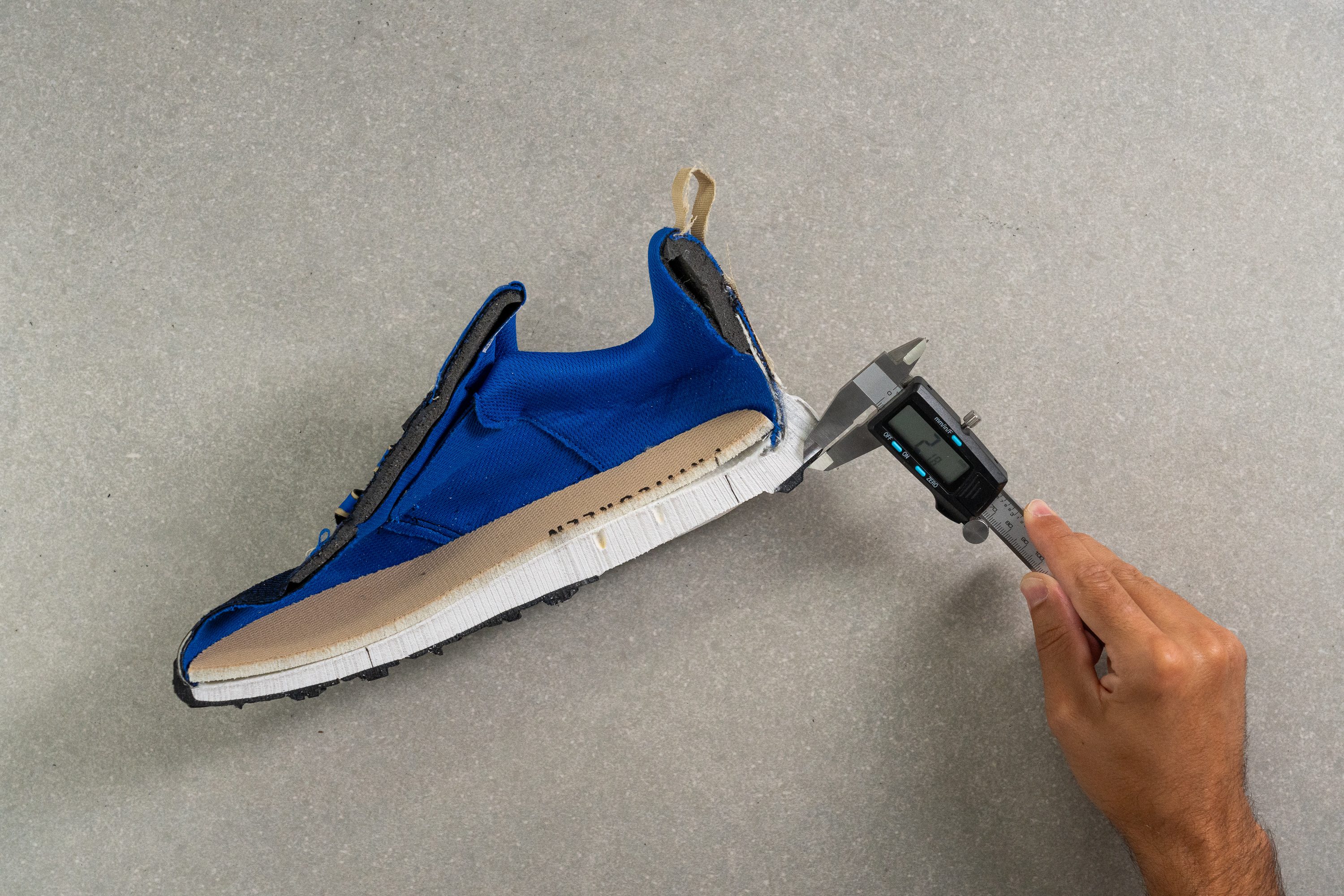
| Terrex Trailmaker | 2.2 mm |
| Average | 2.5 mm |
Misc
Insole thickness
The shoe comes with a pretty basic type of insole. Checking its thickness in the heel, we got 5.0 mm - an average measurement for a hiking shoe.
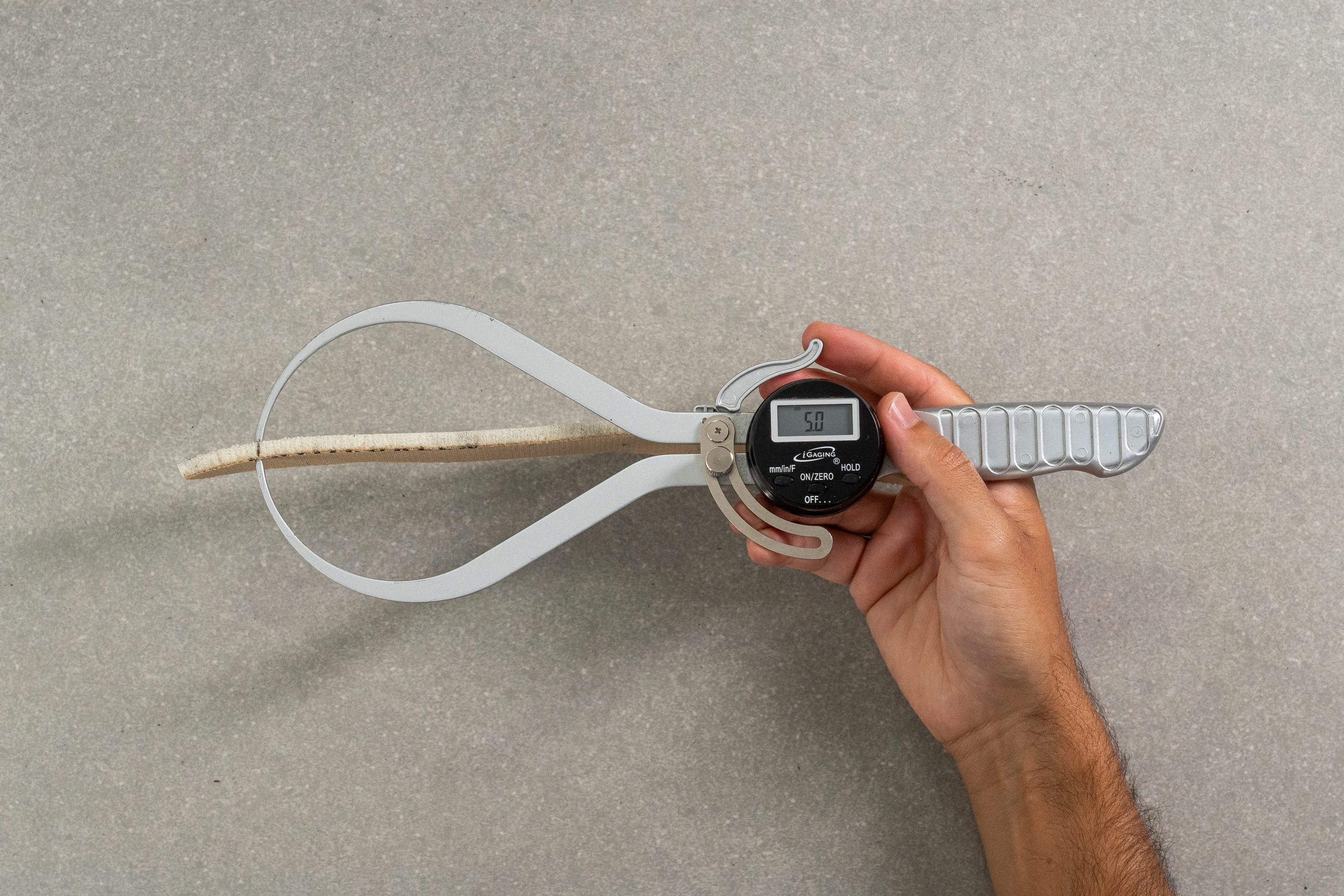
| Terrex Trailmaker | 5.0 mm |
| Average | 5.3 mm |
Removable insole
The insole is quite easy to remove in the Terrex Trailmaker. You can enjoy the benefit of inserting your own orthotics or insoles.
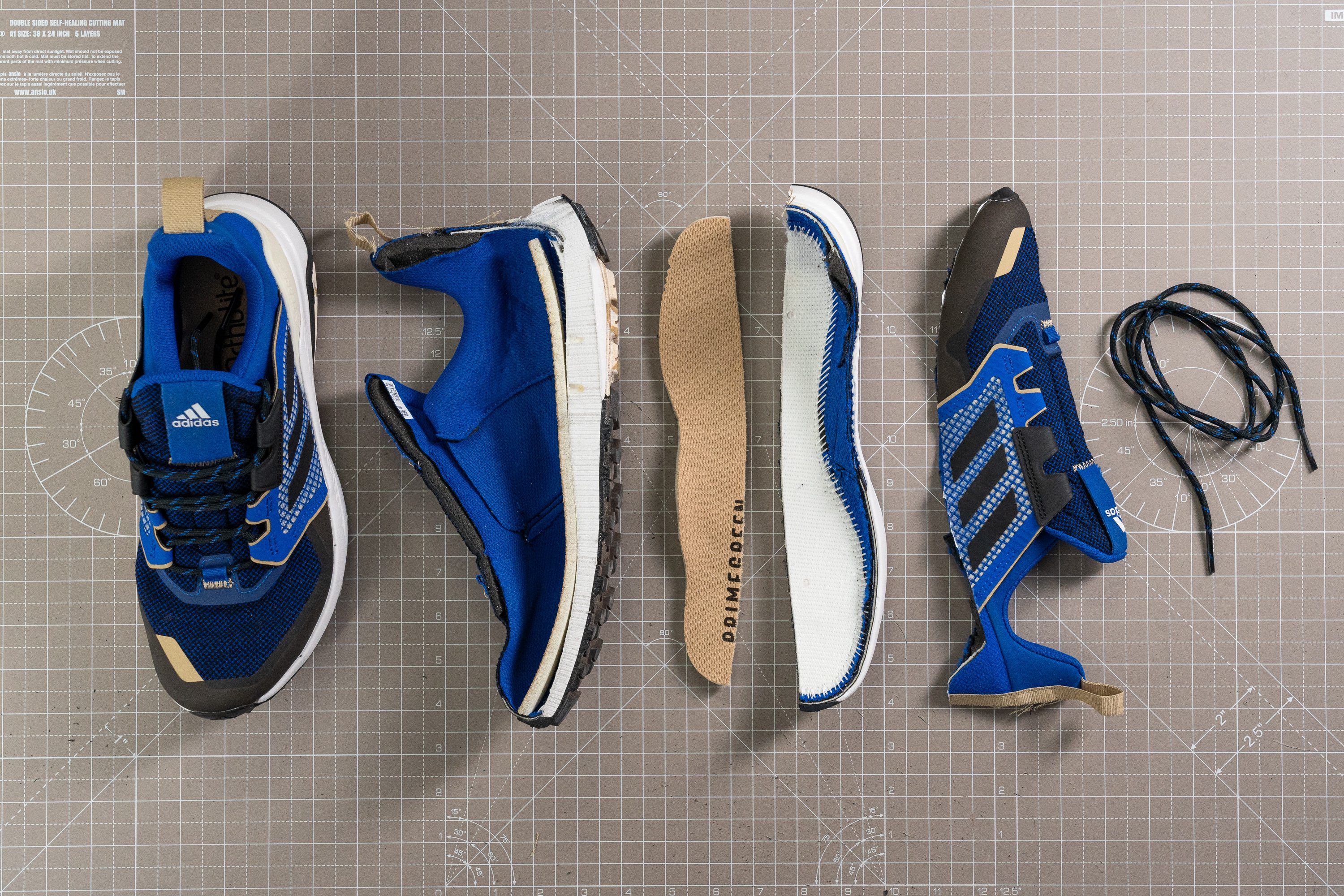
| Terrex Trailmaker | Yes |
Midsole softness in cold (%)
If you decide to rock this Adidas shoe on a chilly day, be prepared that its cushioning will get firmer.
Mimicking winter in our freezer, we kept the shoe in it for 20 minutes and then repeated the durometer measurement.
The tool showed 35.6 which is about as firm as the other hiking shoes get on average.
Compared to room temperature, the shoe's foam firmed up by 20.8%. Keep that in mind if you consider the Trailmaker for a cold-day adventure.
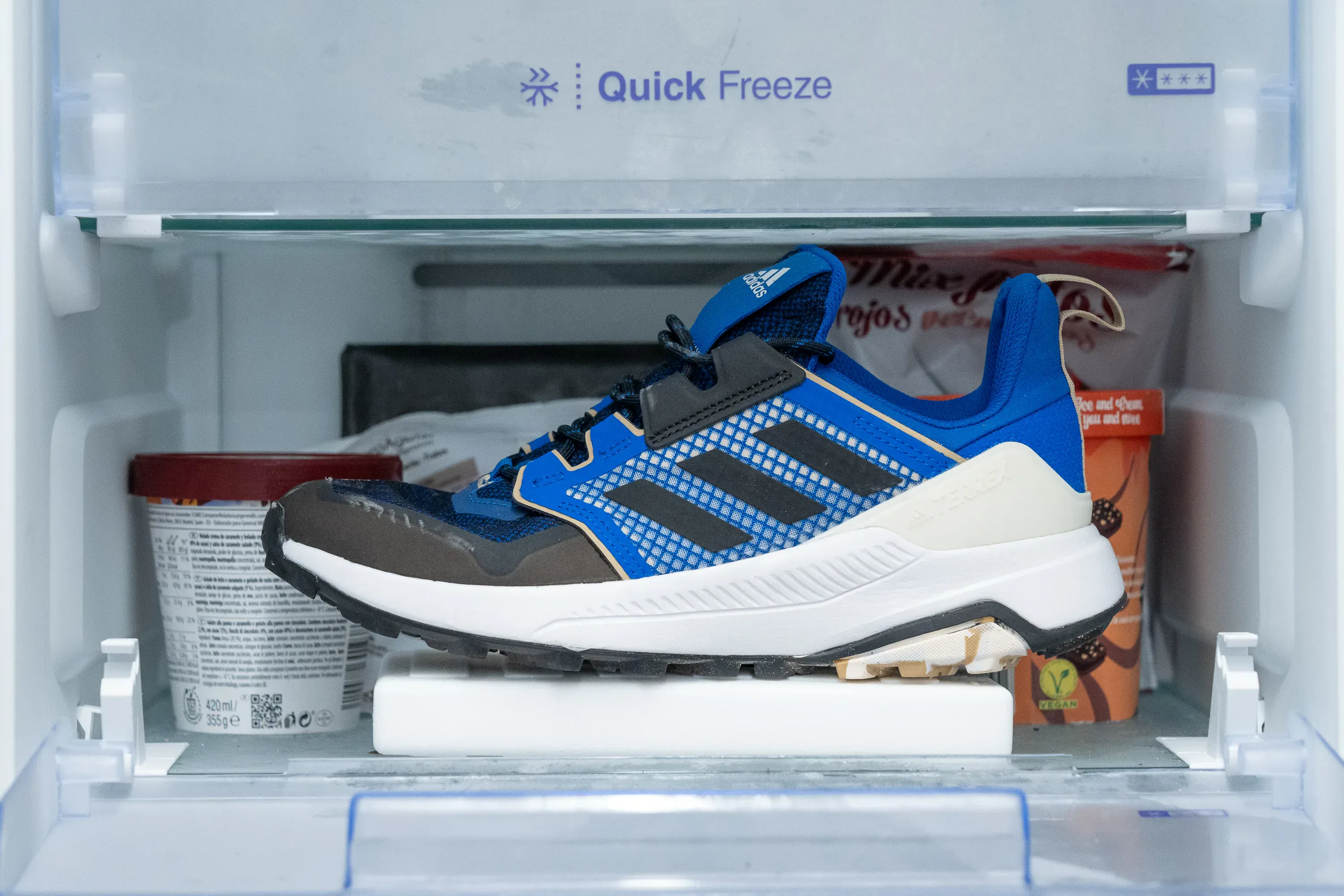
| Terrex Trailmaker | 21% |
| Average | 19% |
Reflective elements
There are no reflective elements on the Adidas Trailmaker. Better be back home before it gets dark!
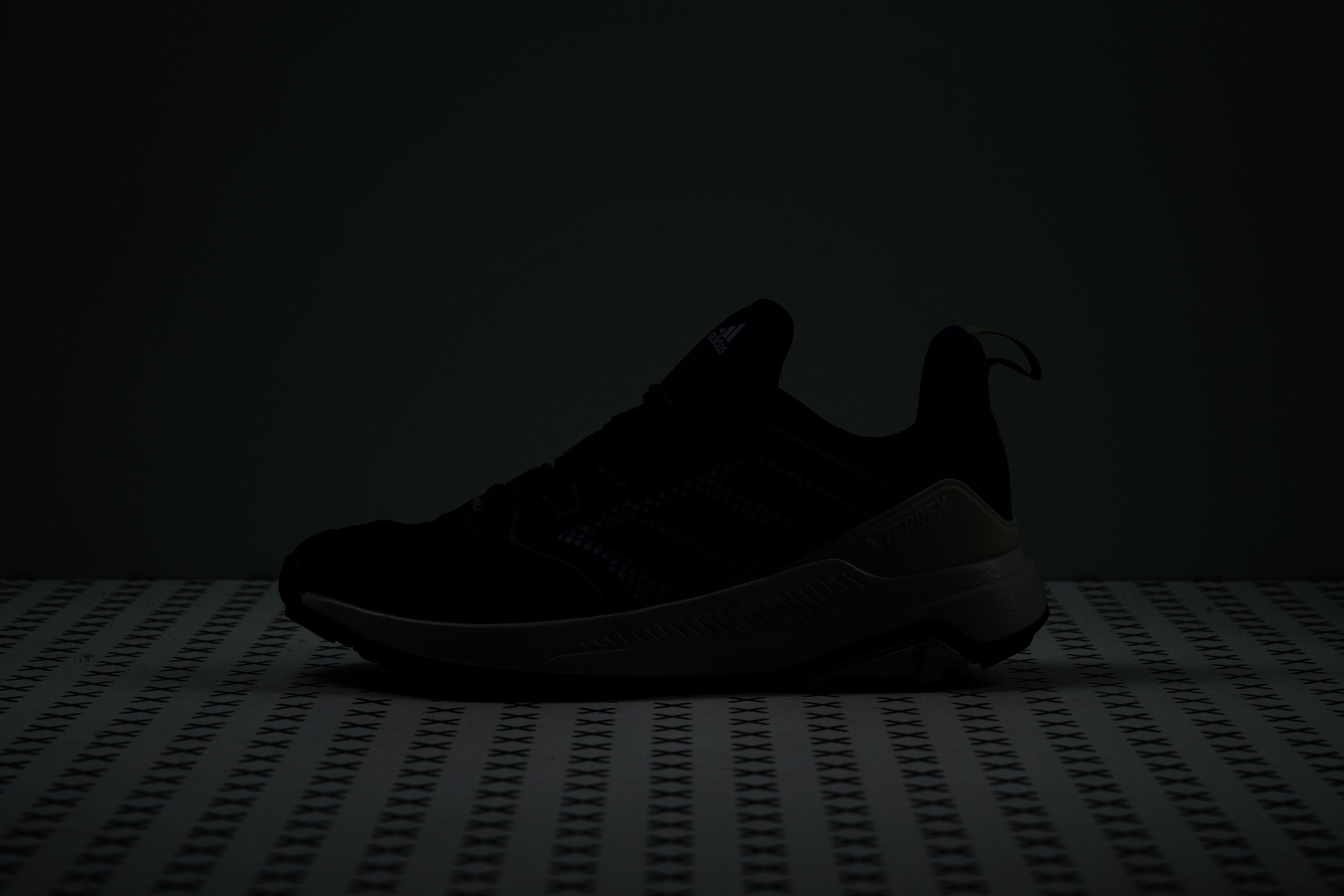
| Terrex Trailmaker | No |
Tongue padding
The tongue is moderately padded at 7.5 mm, according to our tool. Even though it is not as much padding as some of the other hiking shoes offer, it still makes the shoe's interiors sooo incredibly comfortable!
We didn't want to get the shoes off after the trail test! So we just kept the pair on for the rest of the day.
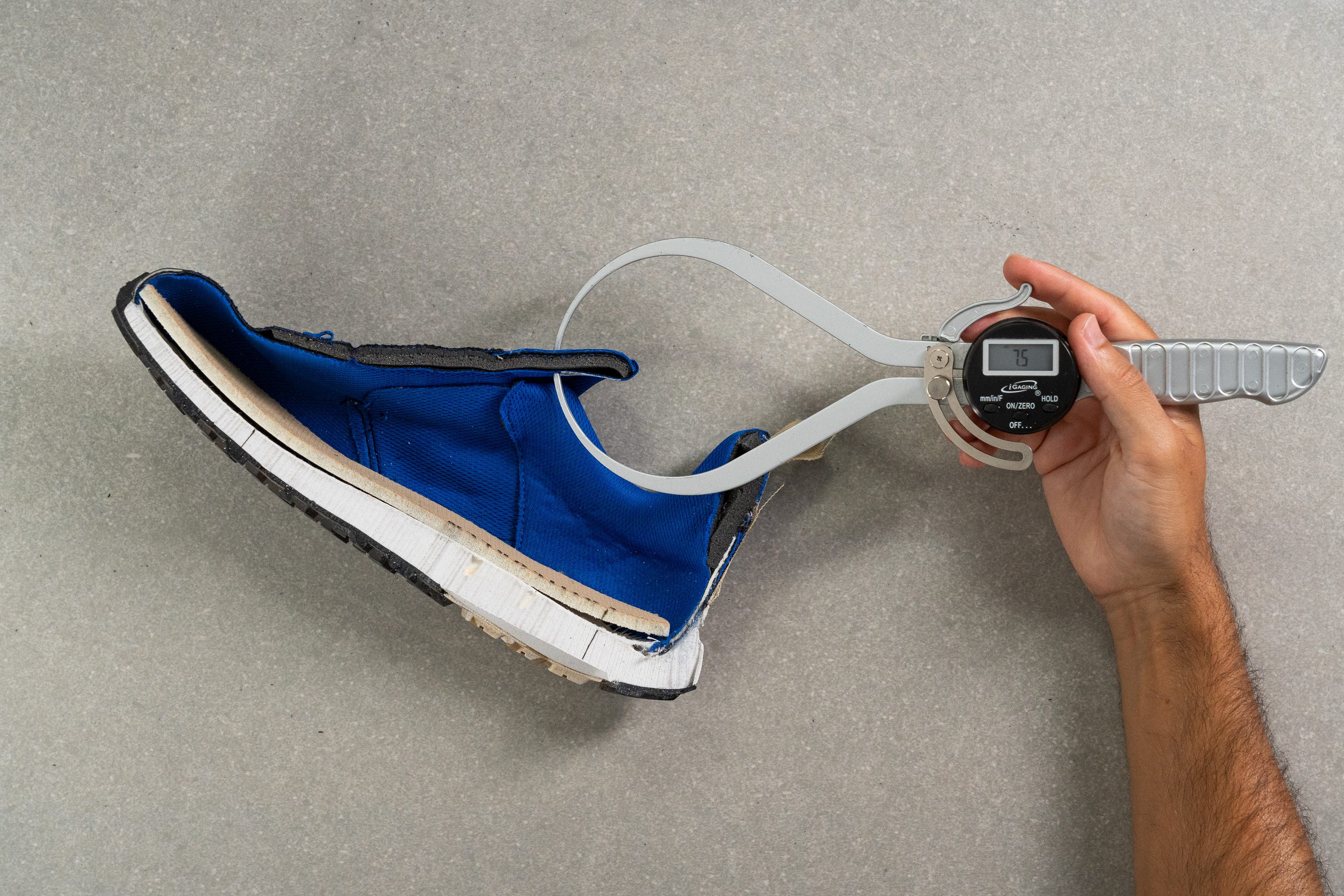
| Terrex Trailmaker | 7.5 mm |
| Average | 10.2 mm |
Tongue: gusset type
The Trailmaker has a bootie-style upper which means that the tongue is fully integrated into the rest of the shoe. It creates a very secure foothold and we could never complain about the lockdown.
The entire foot and heel remained locked in place for as long as we stayed on the trail.
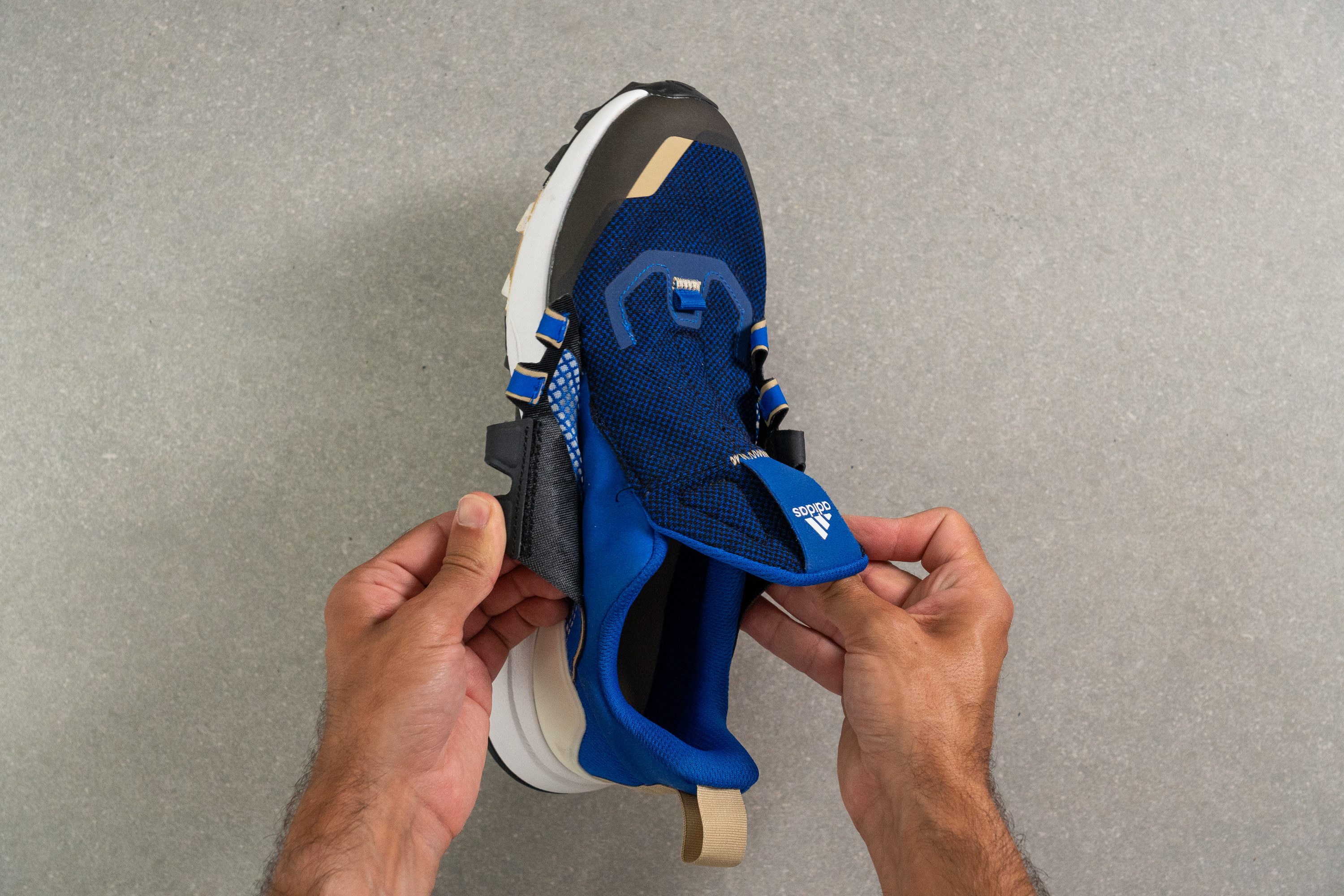
| Terrex Trailmaker | Bootie |
Heel tab
Adidas added a rather sizeable finger loop onto the back of the Trailmaker. Not only does it help to get the shoe on faster, it adds a really stylish touch to this Terrex offering.
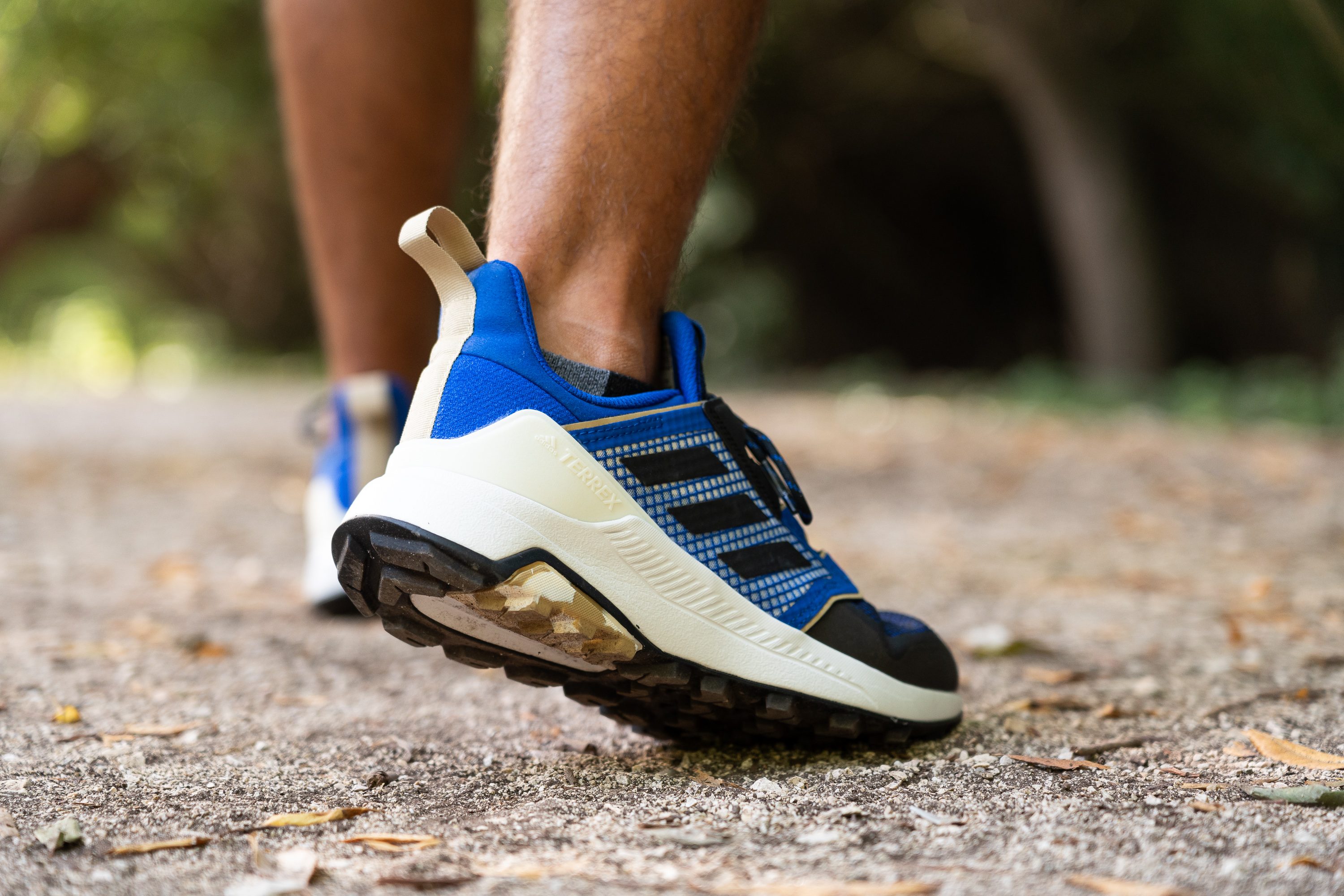
| Terrex Trailmaker | Finger loop |

